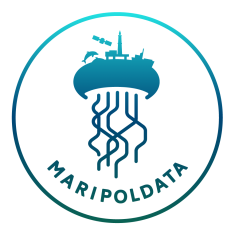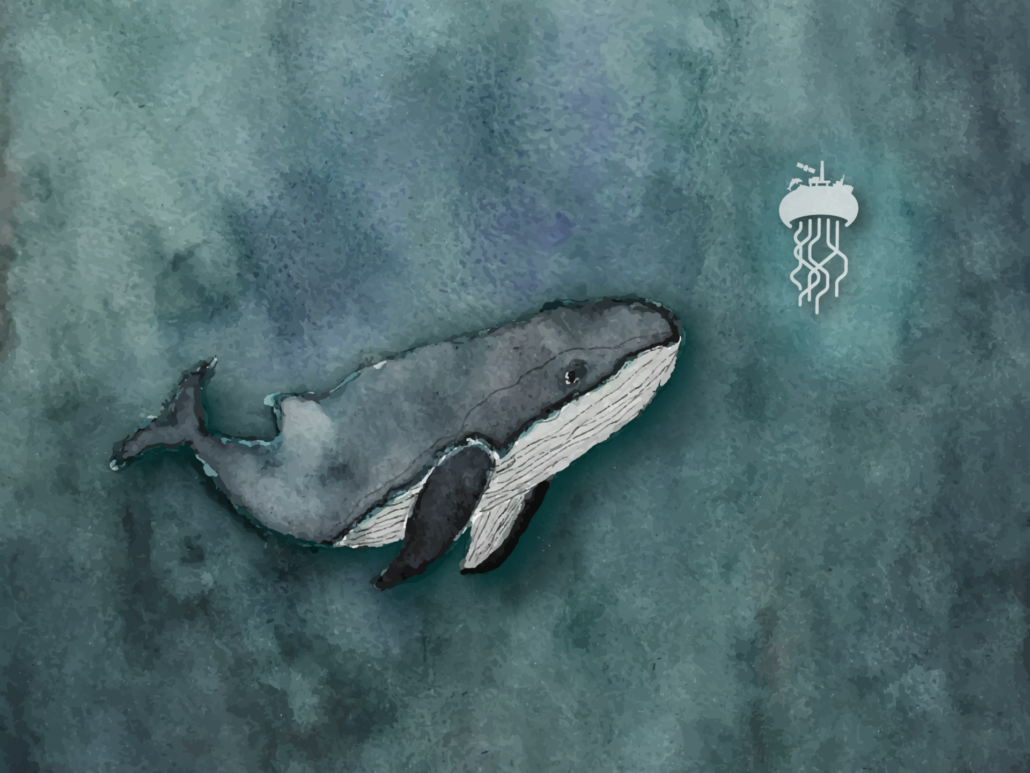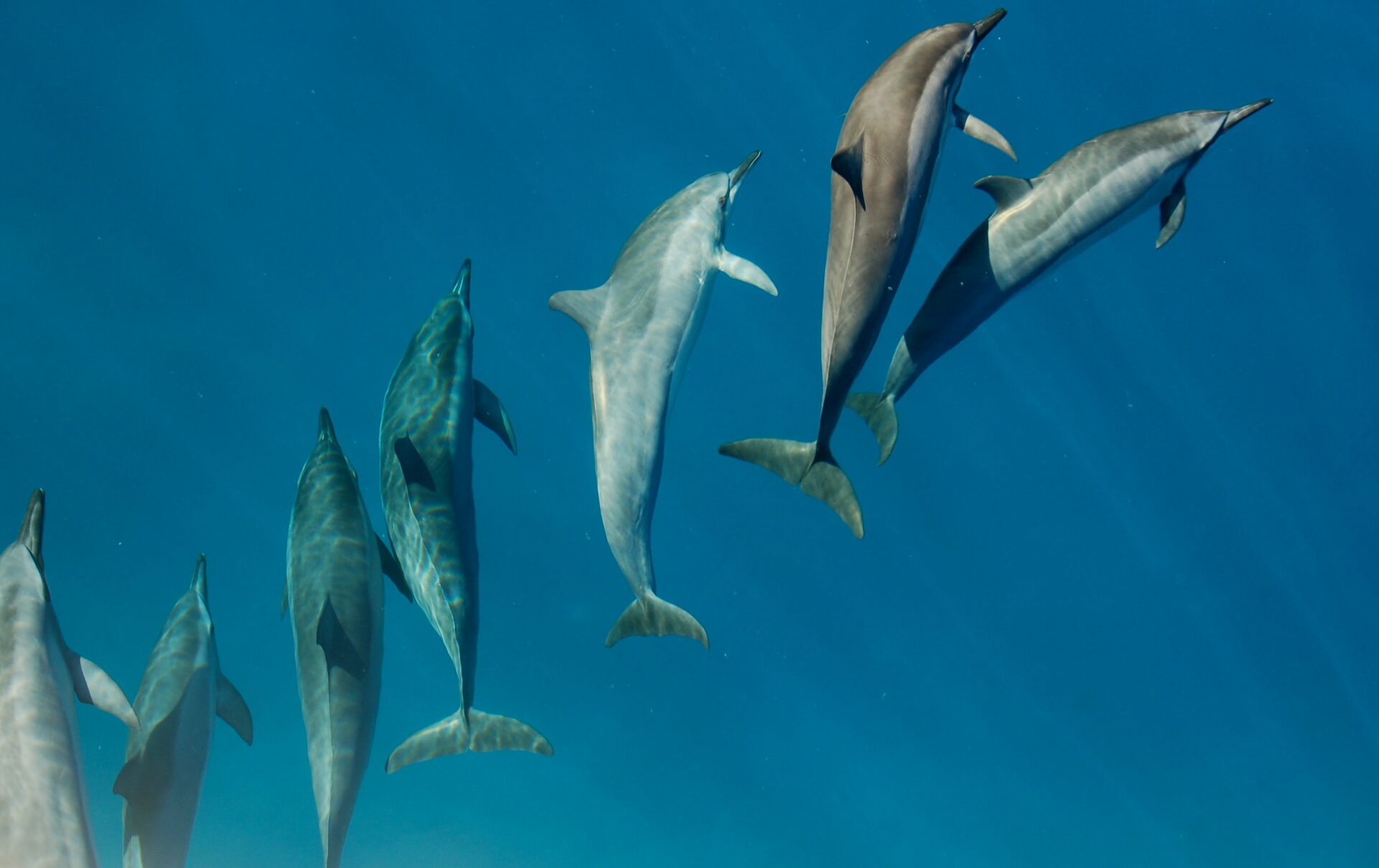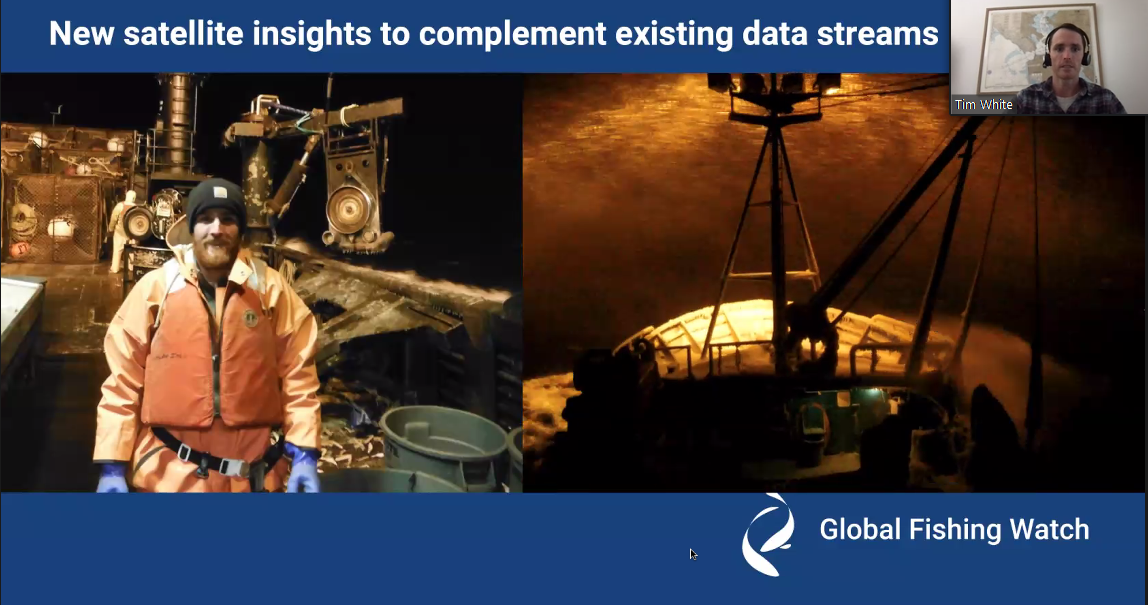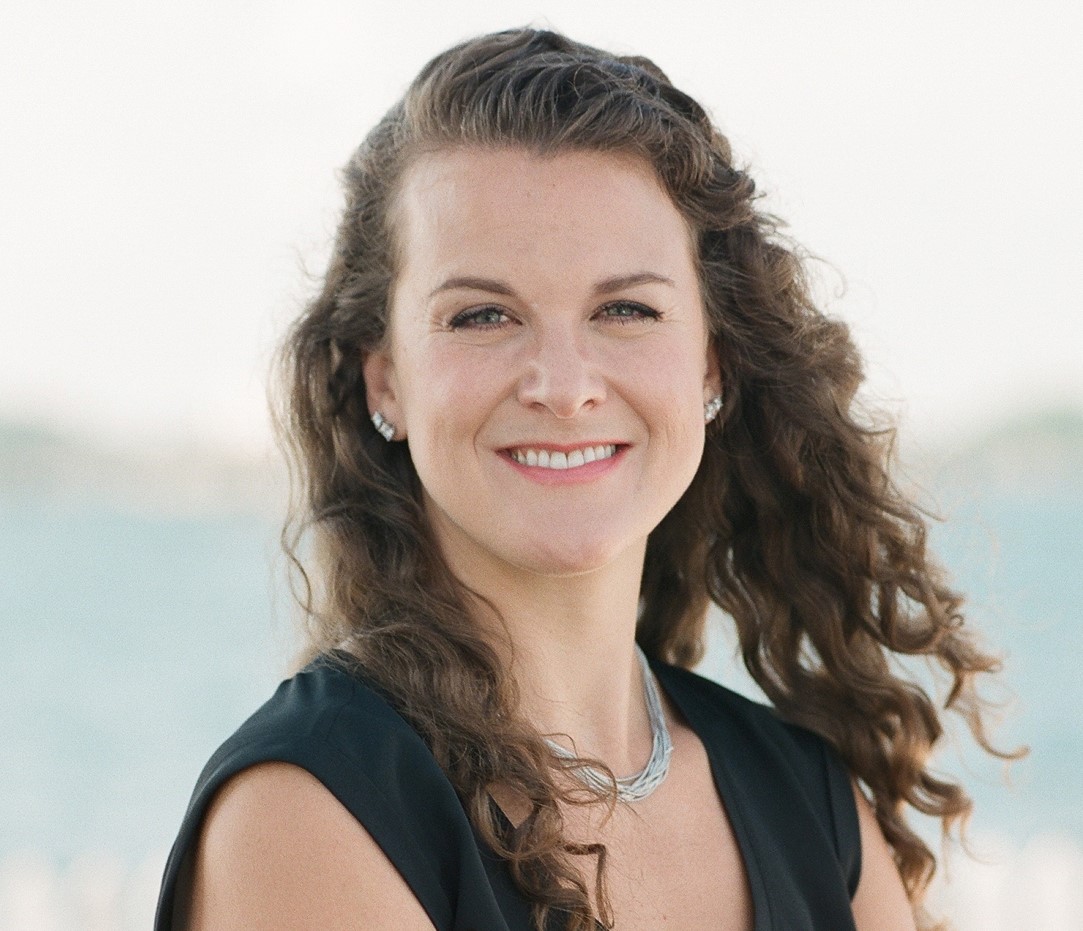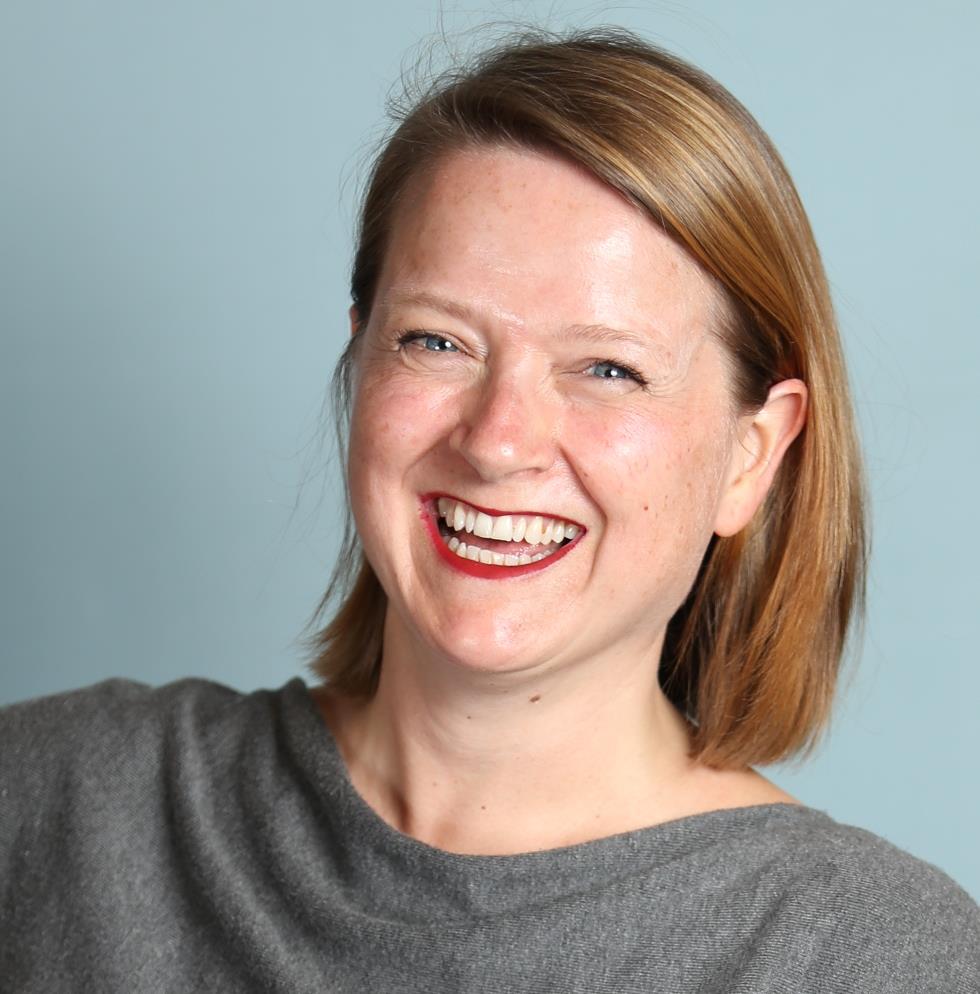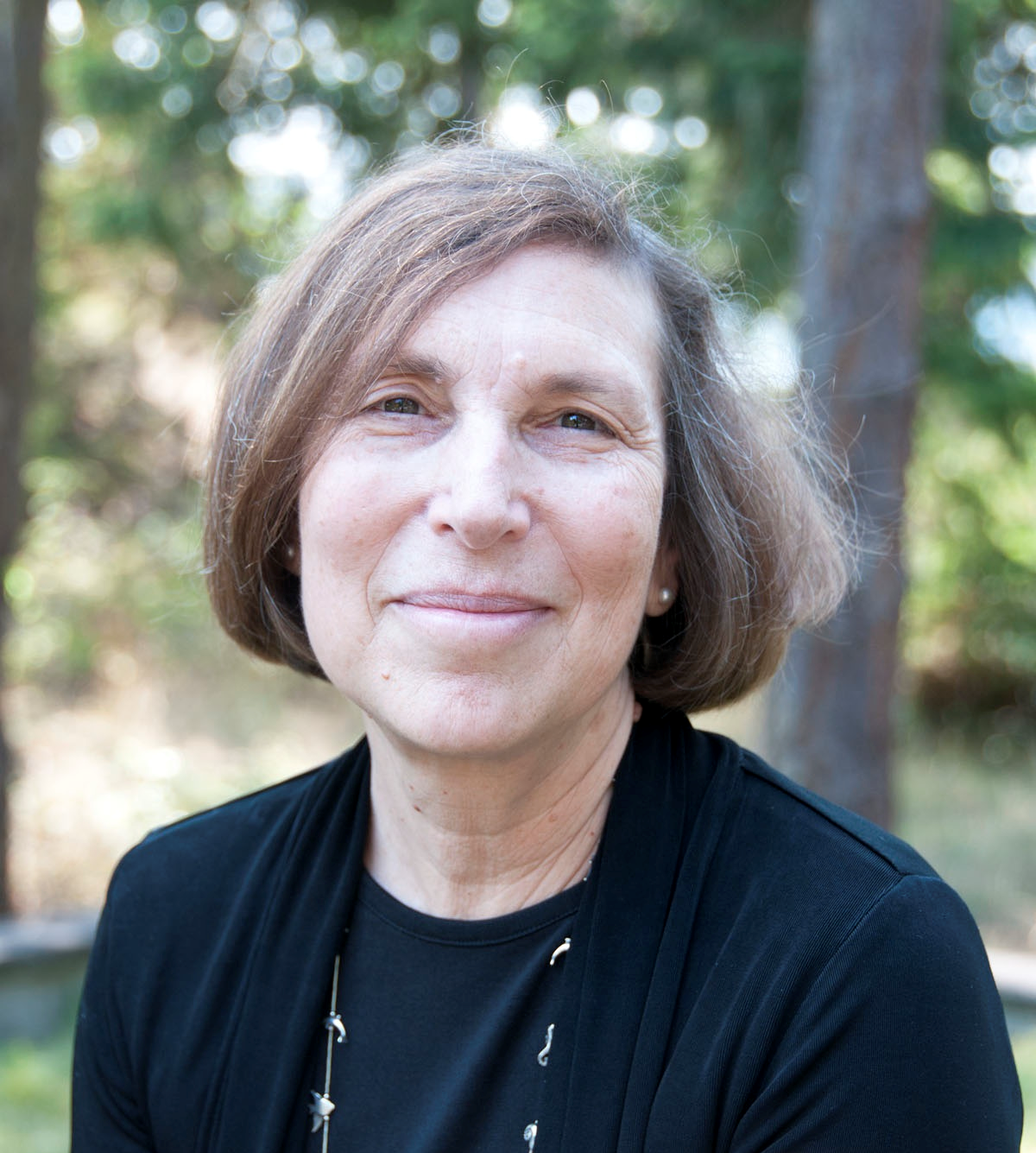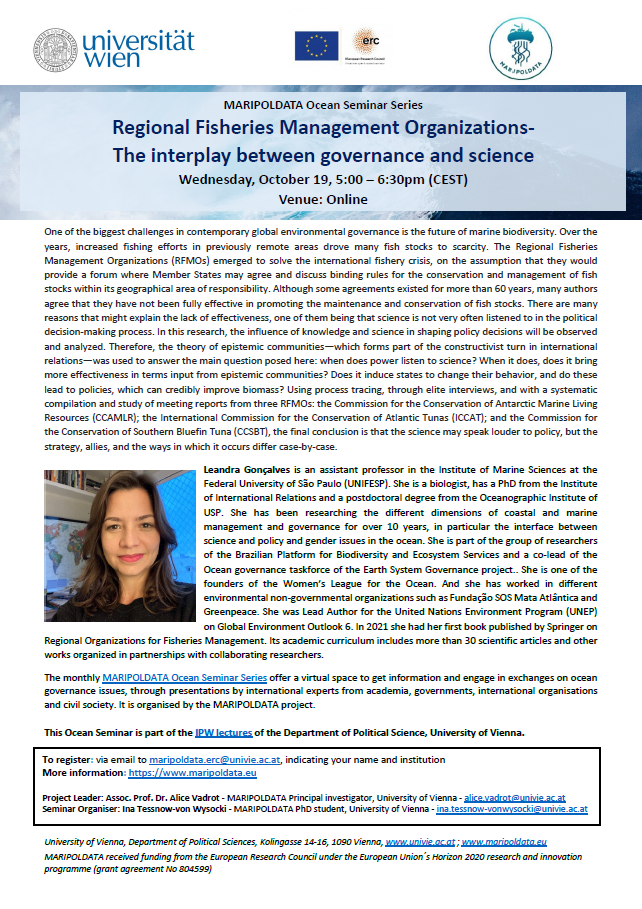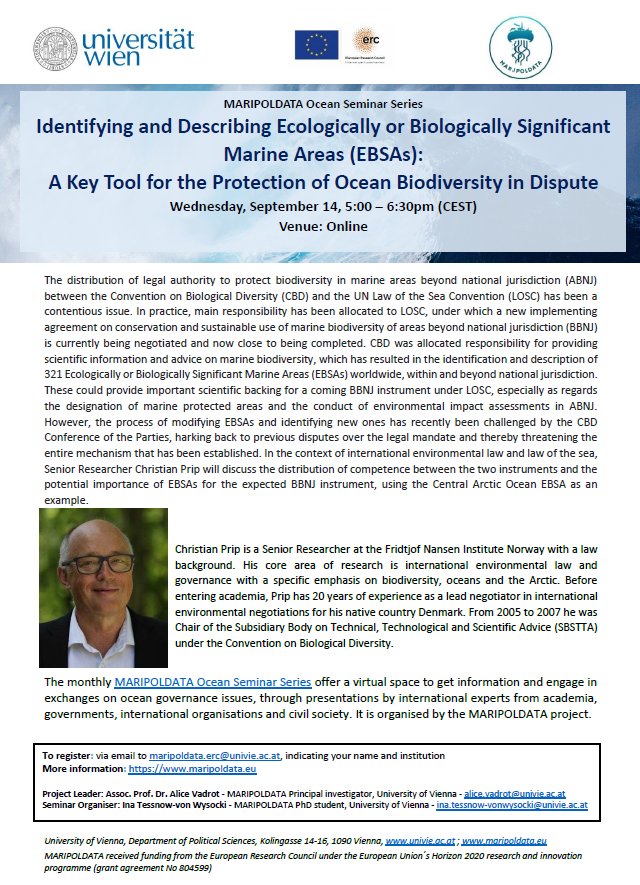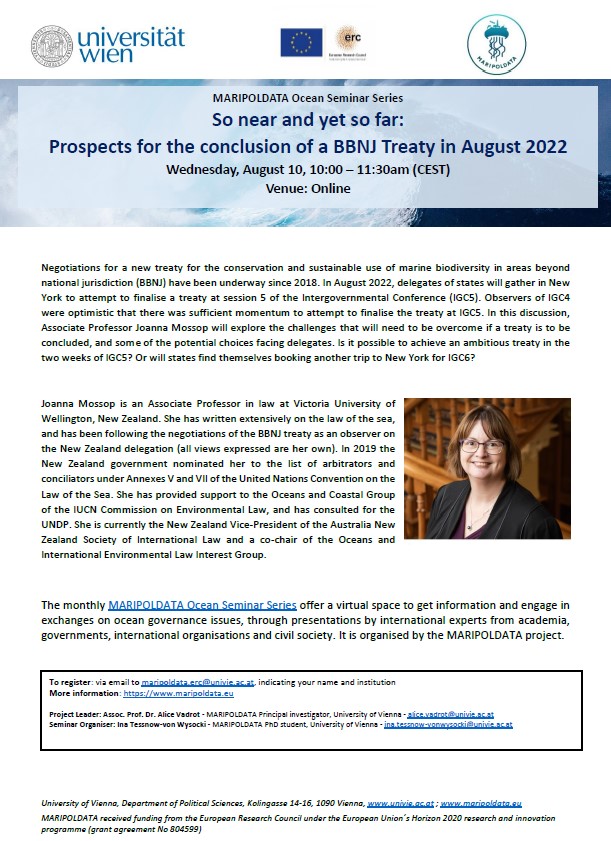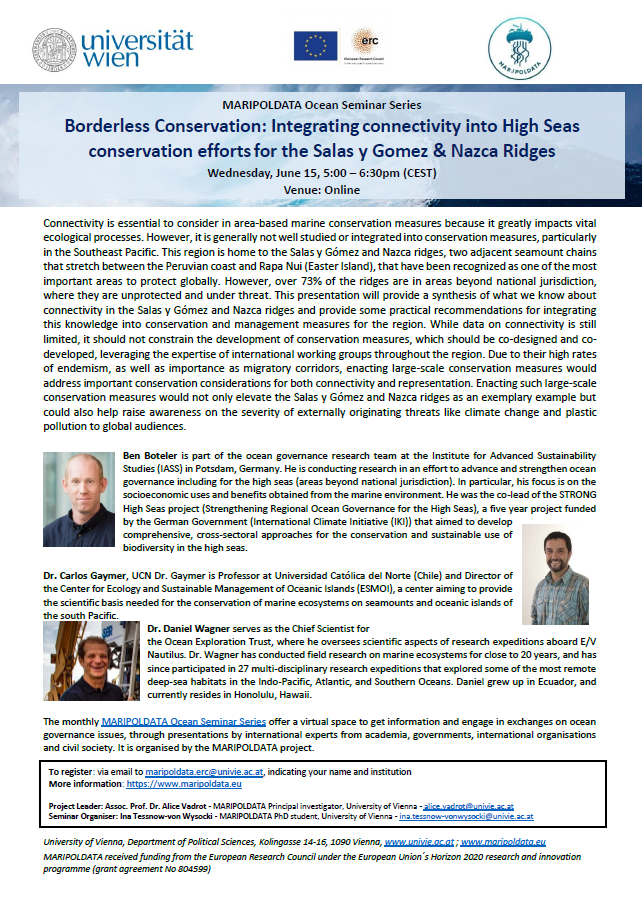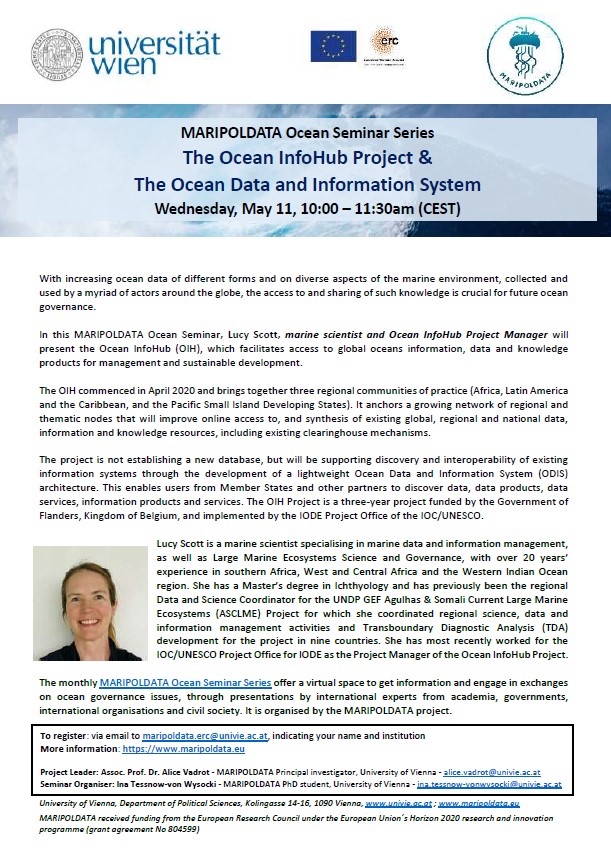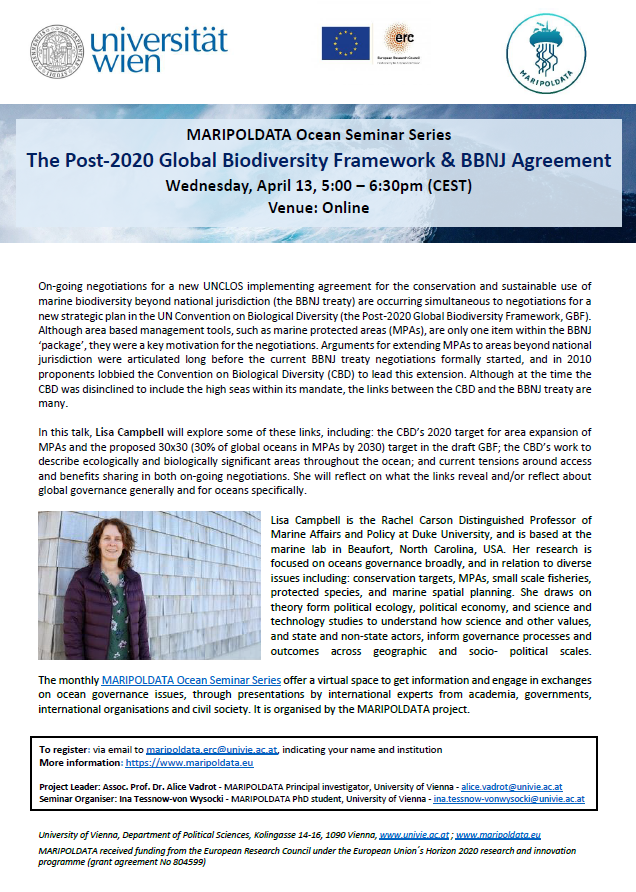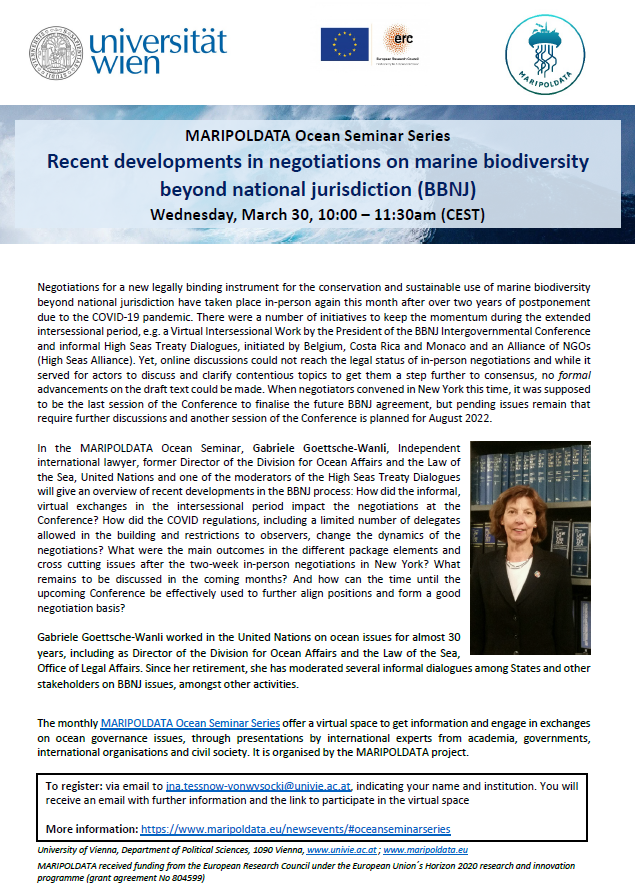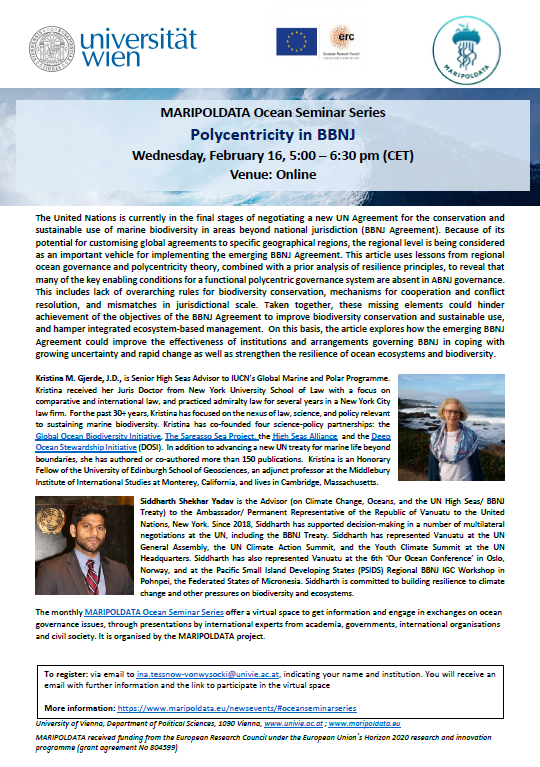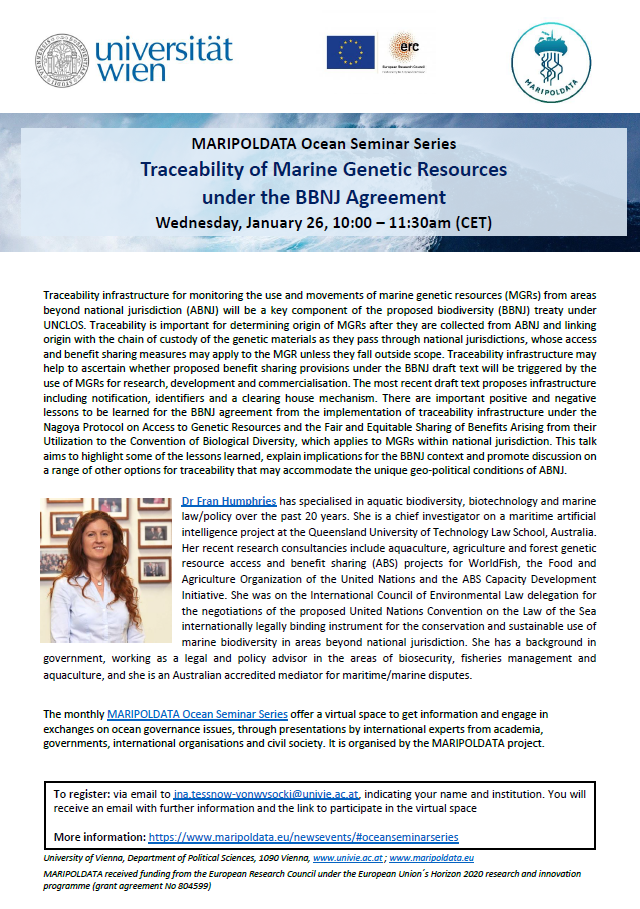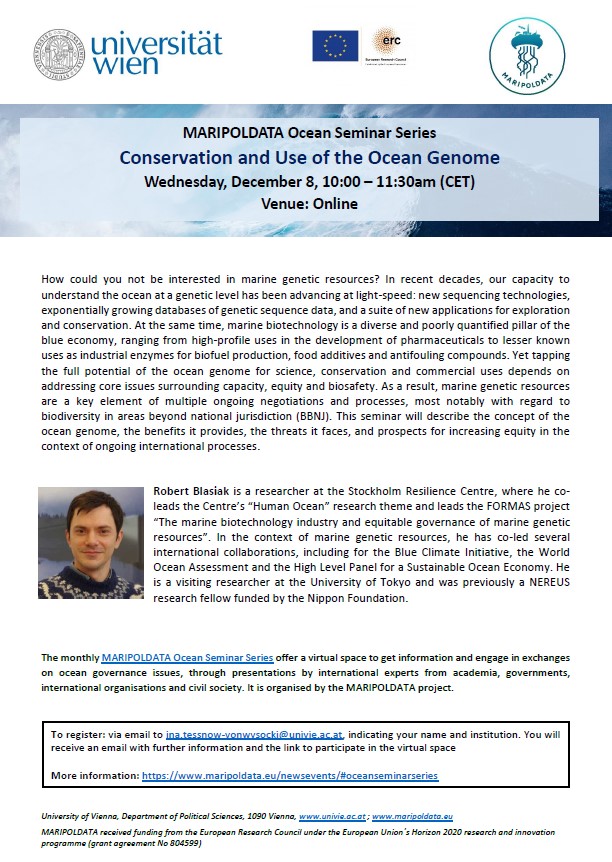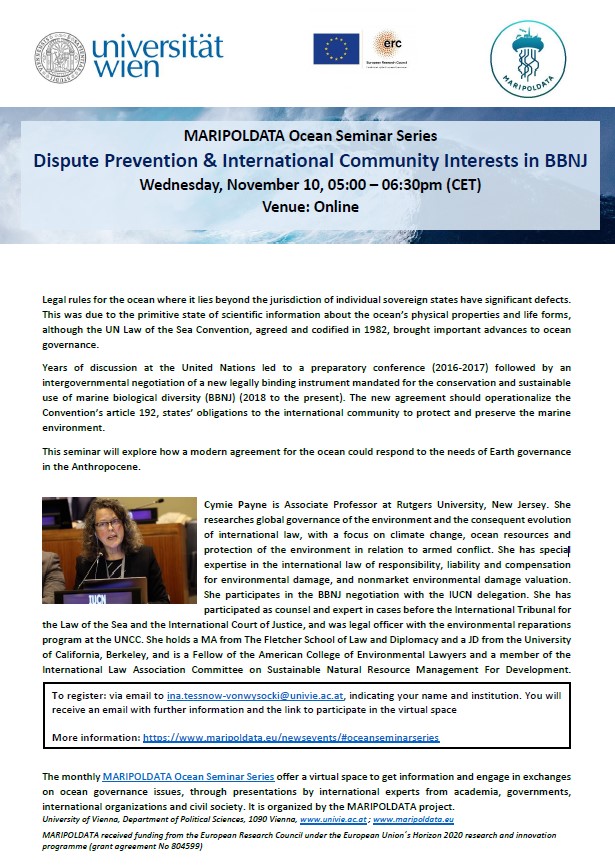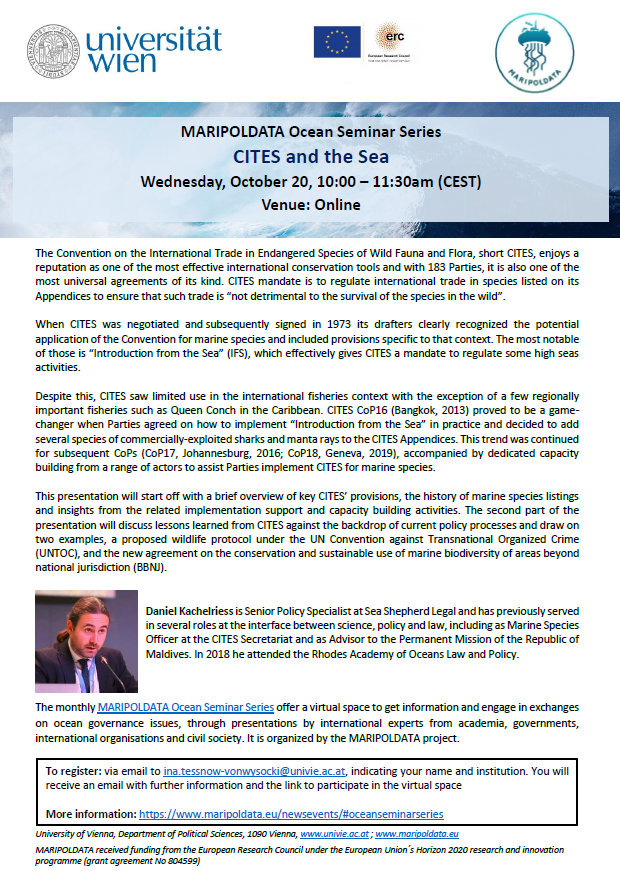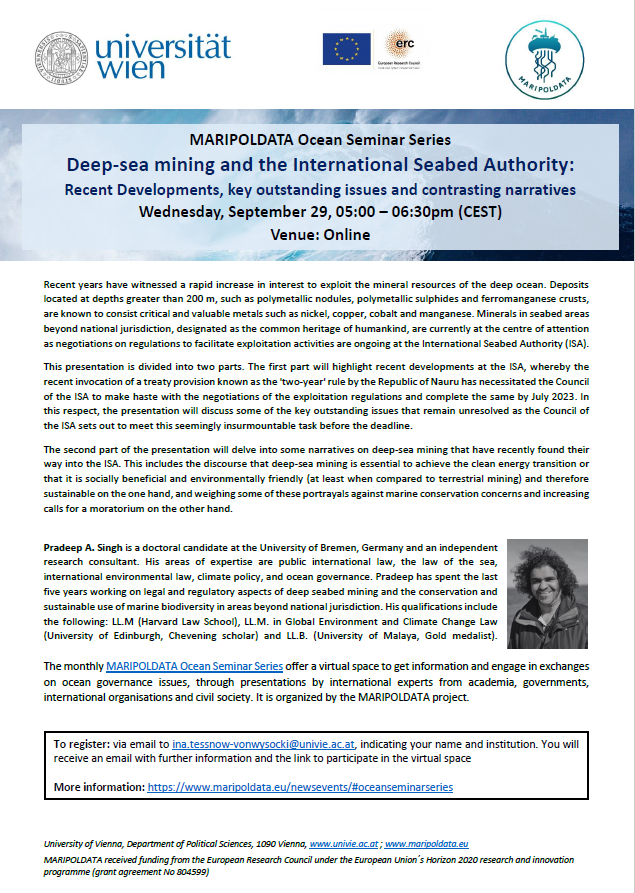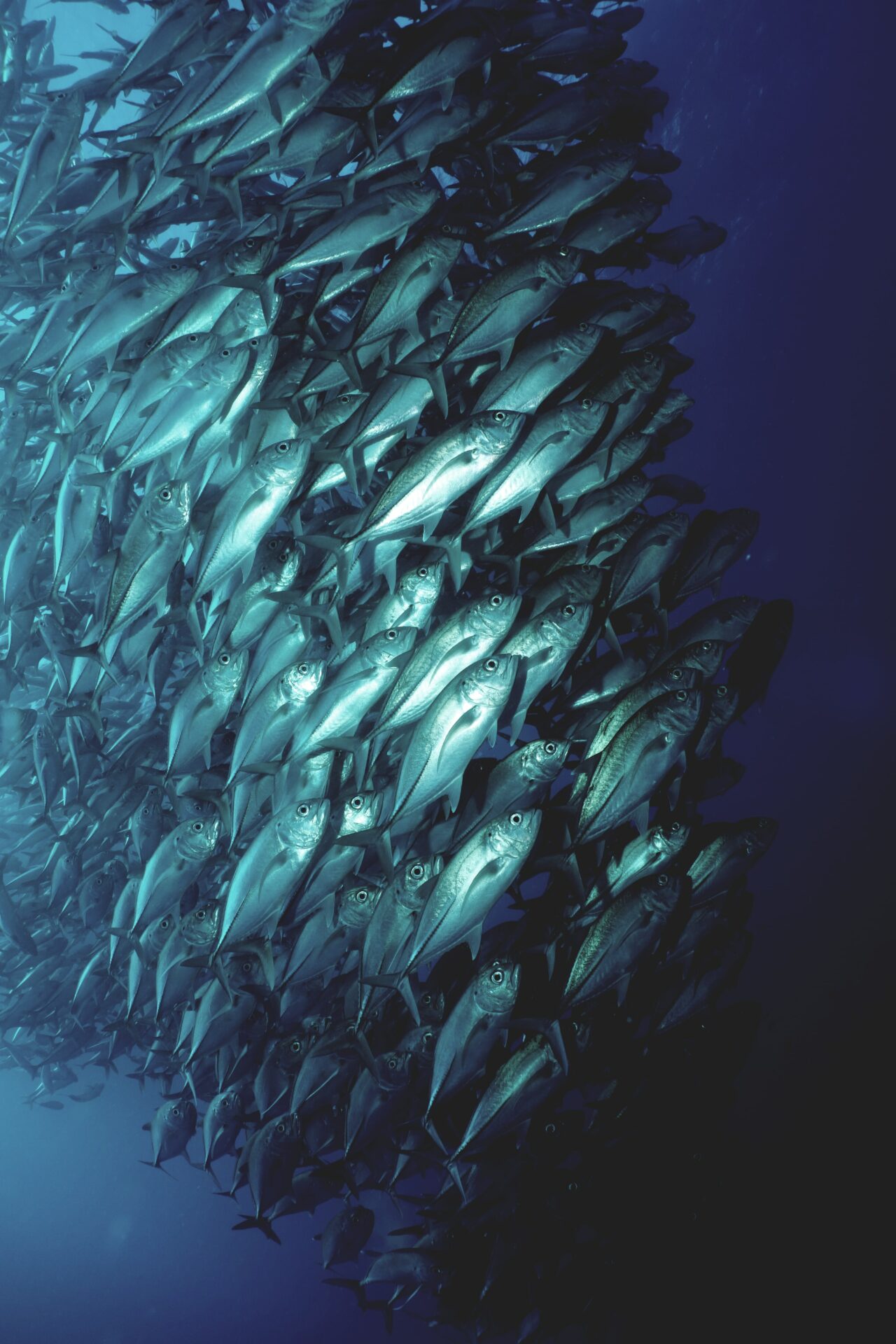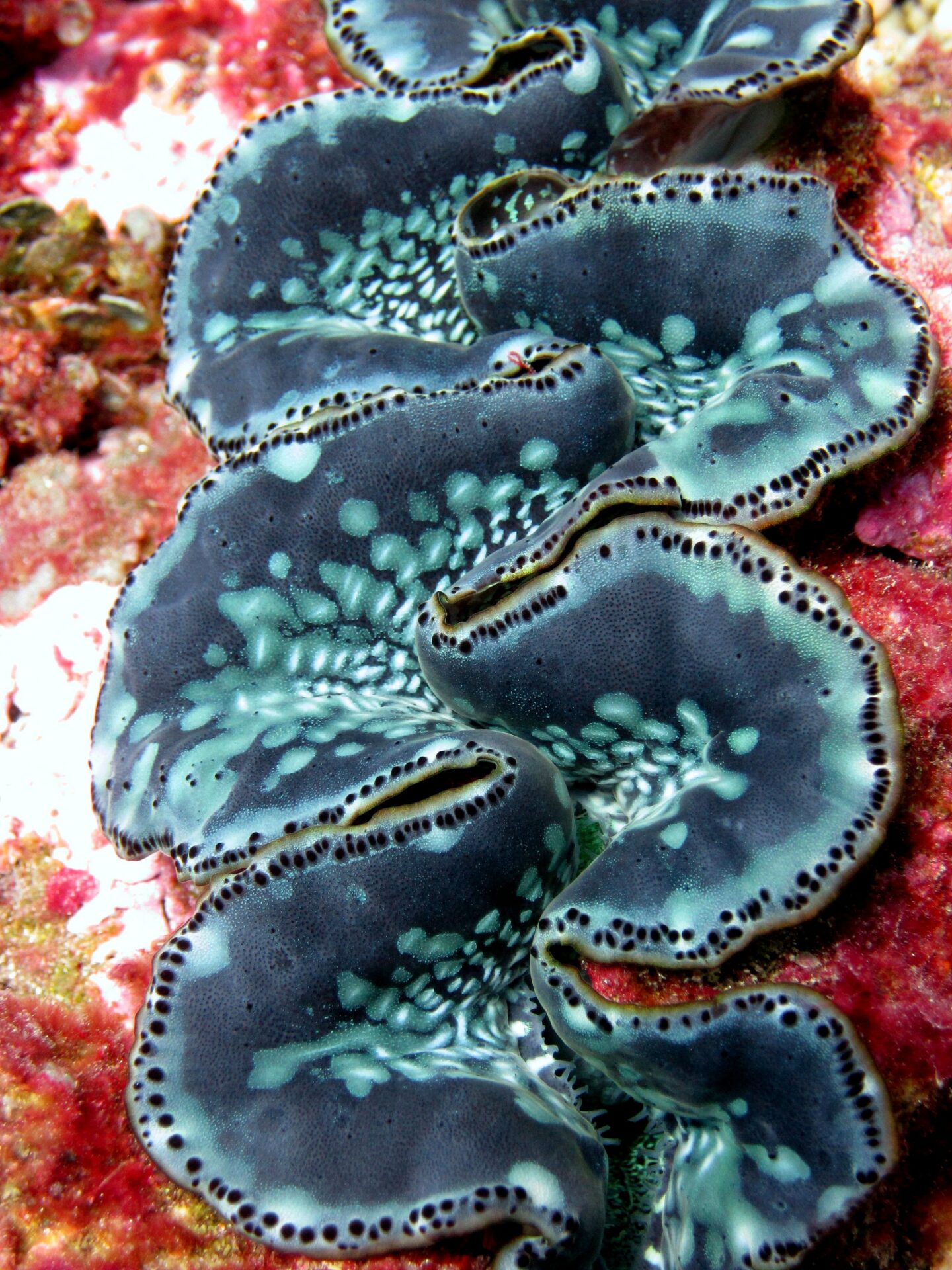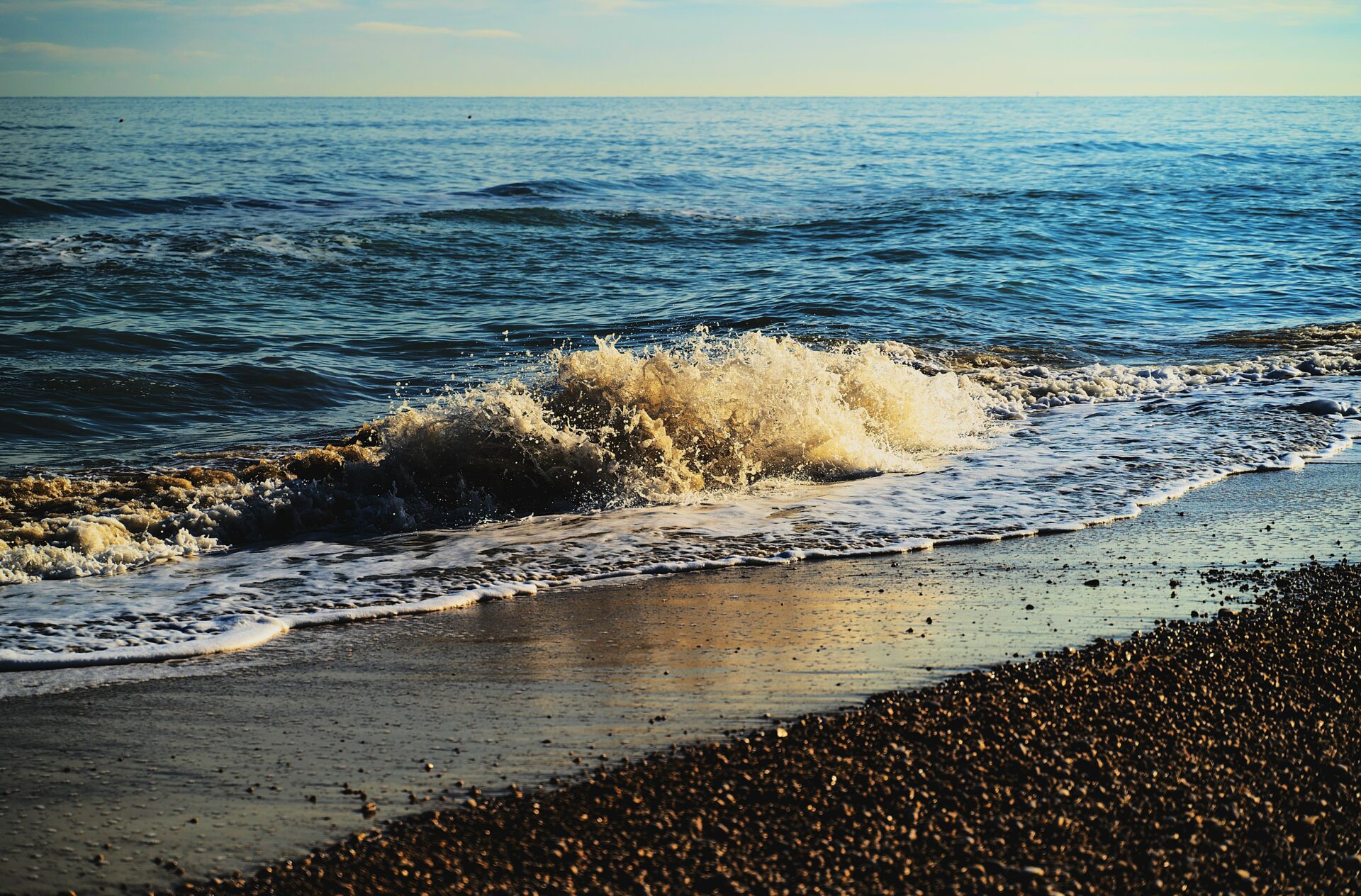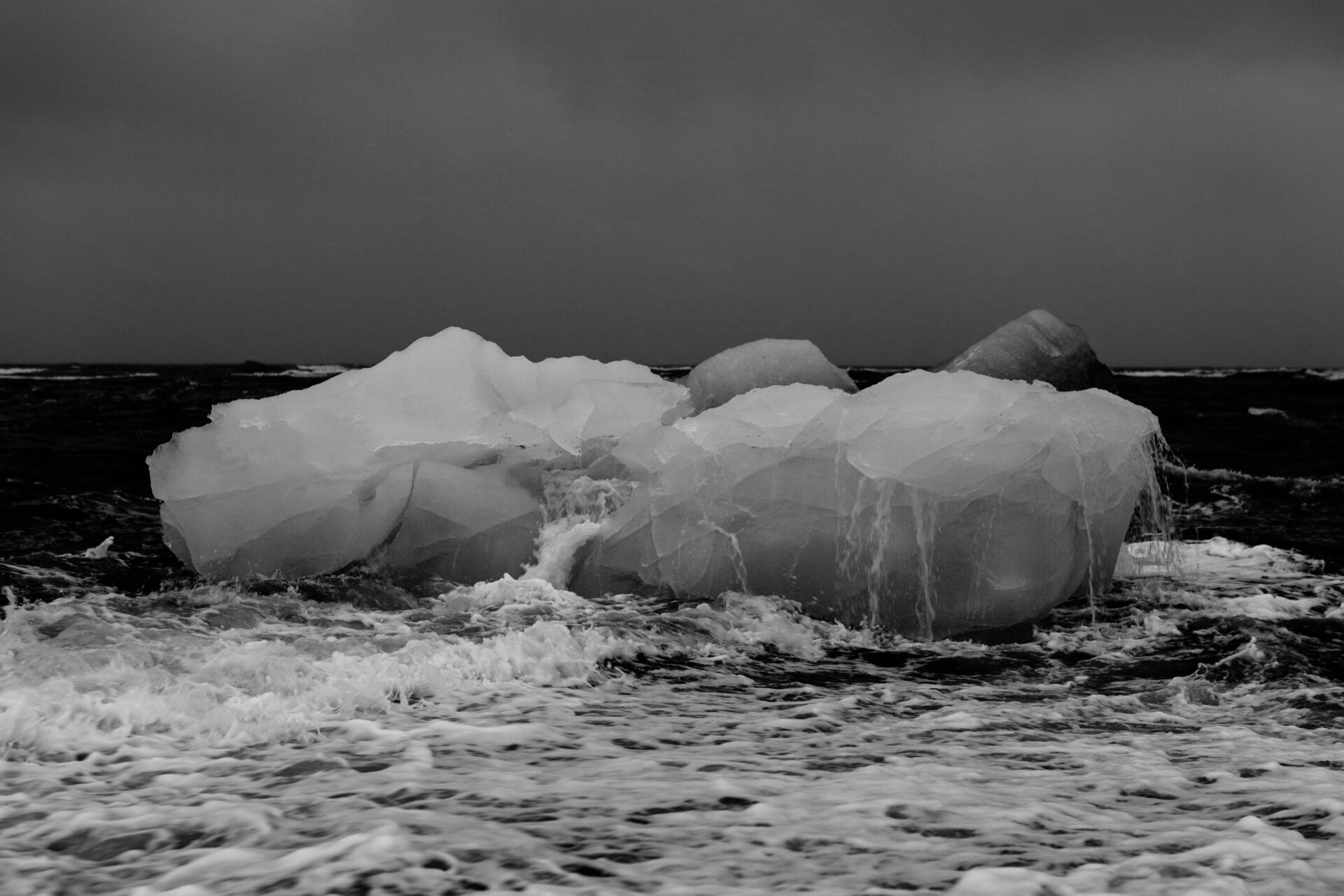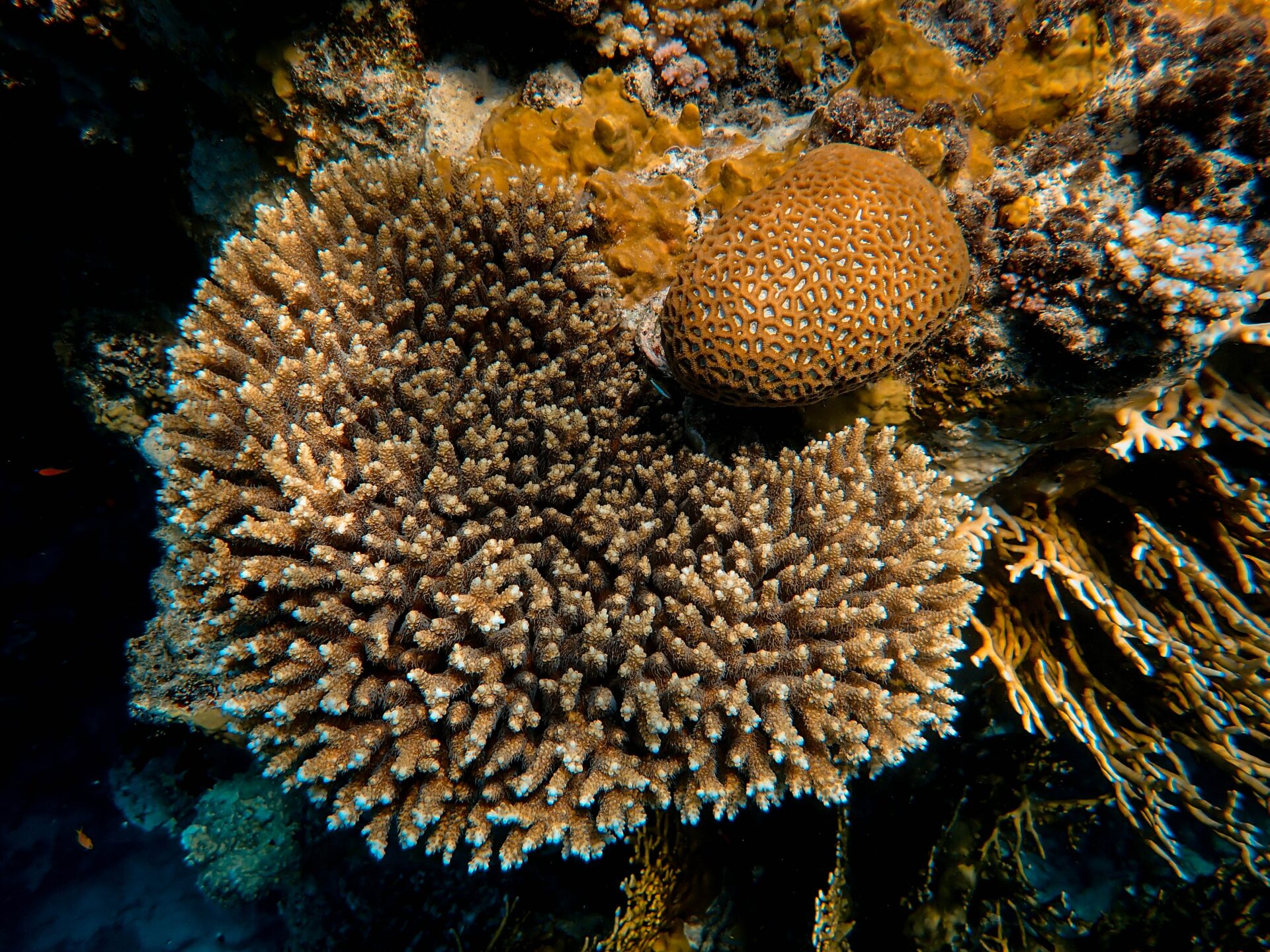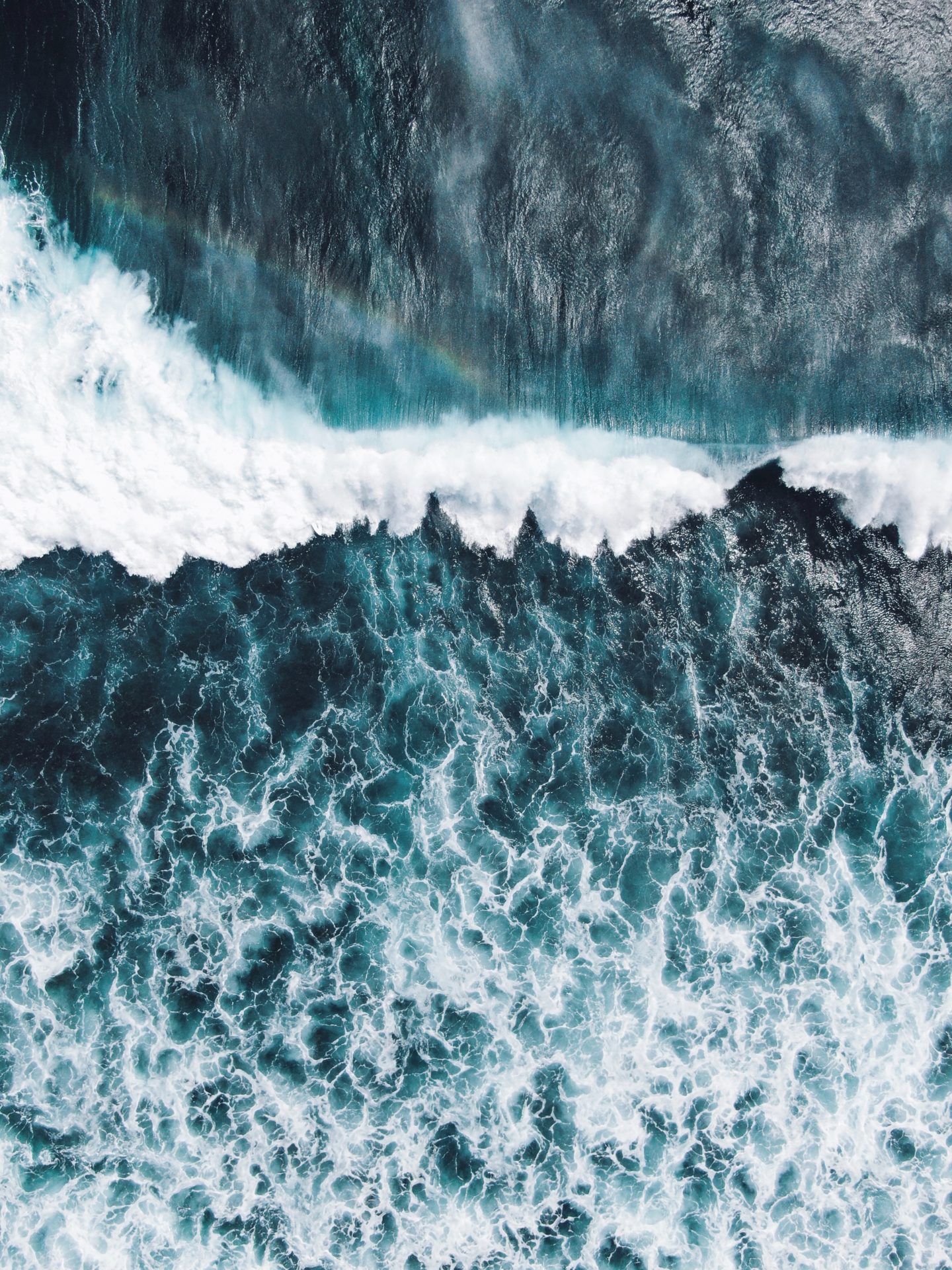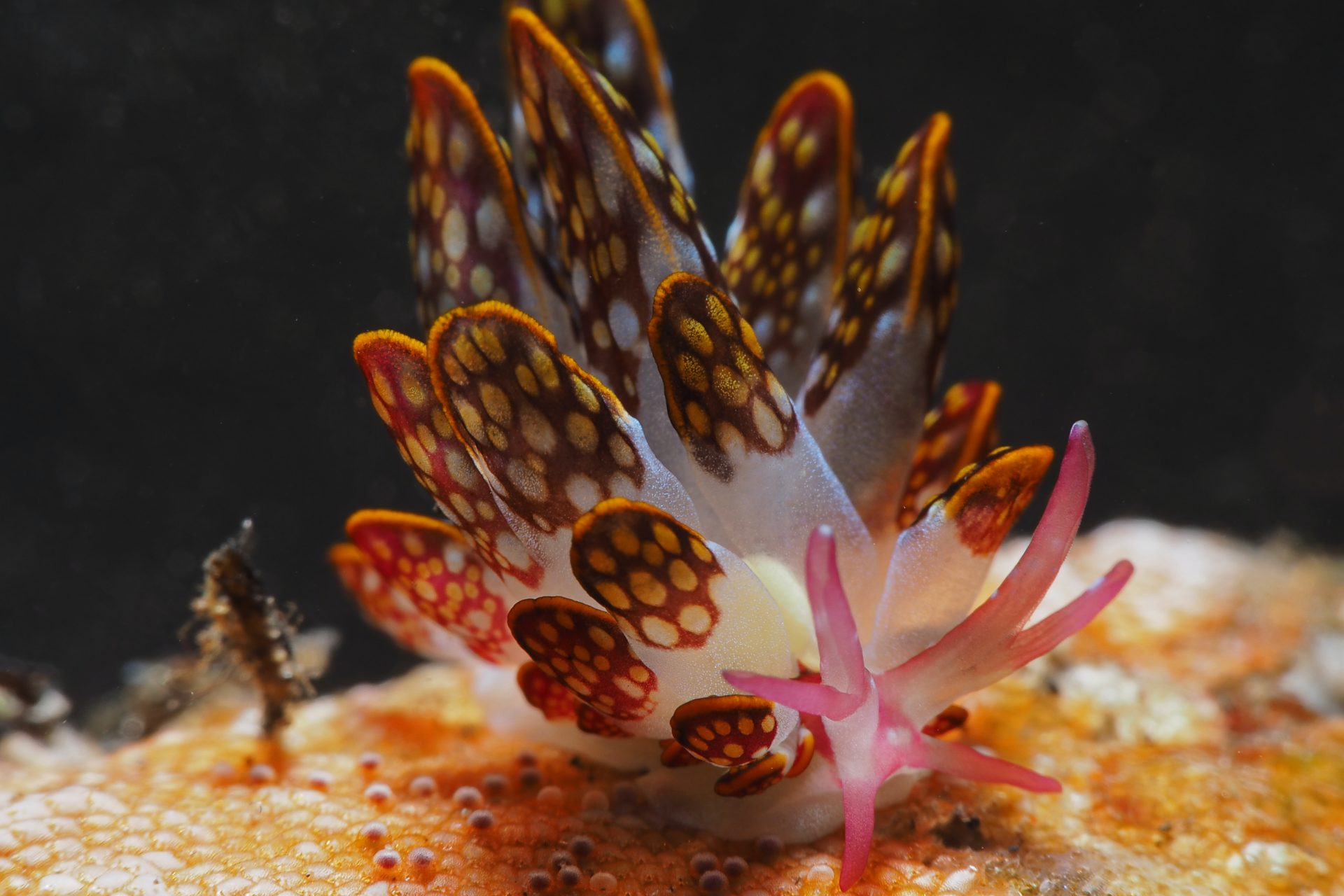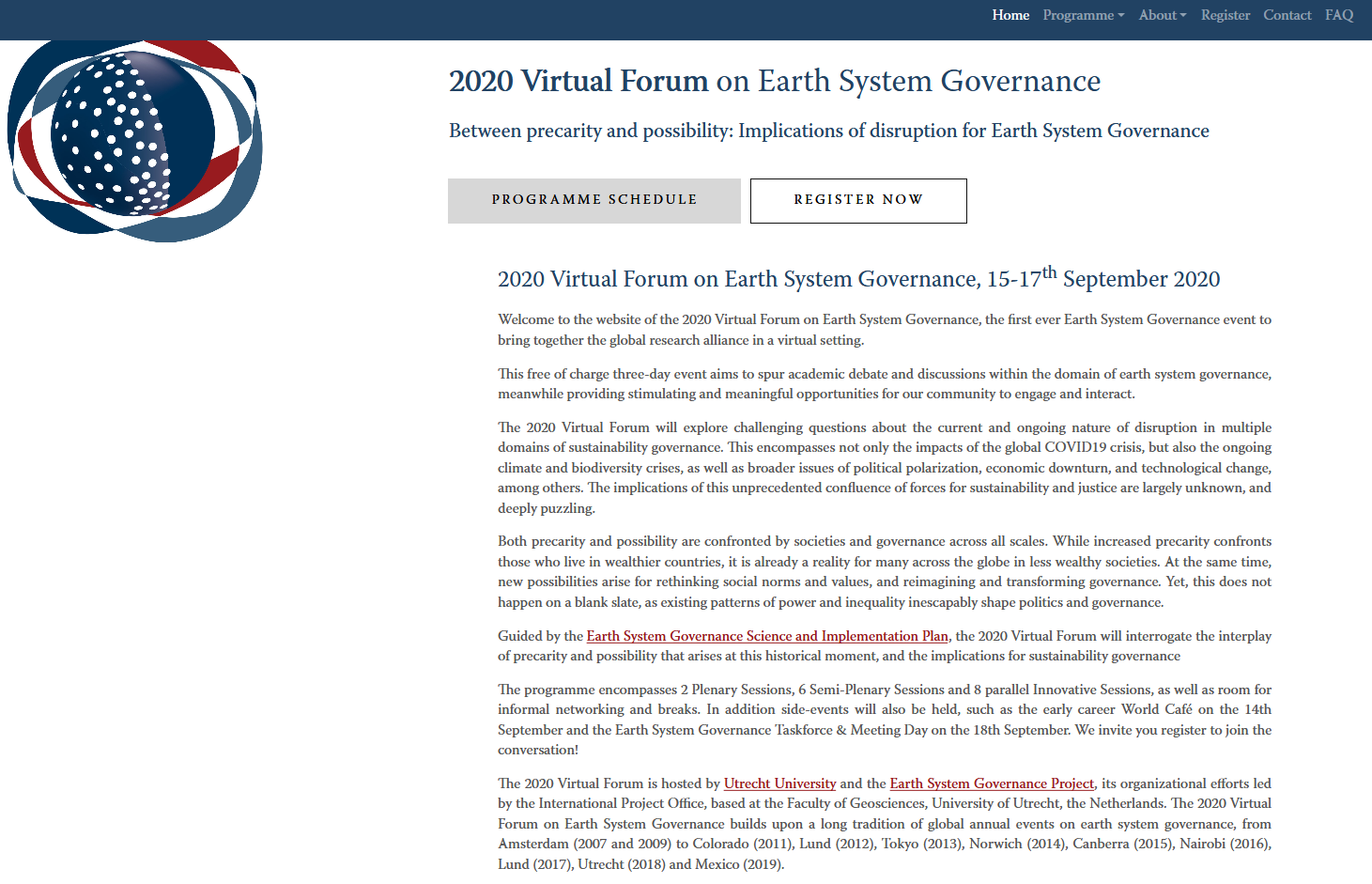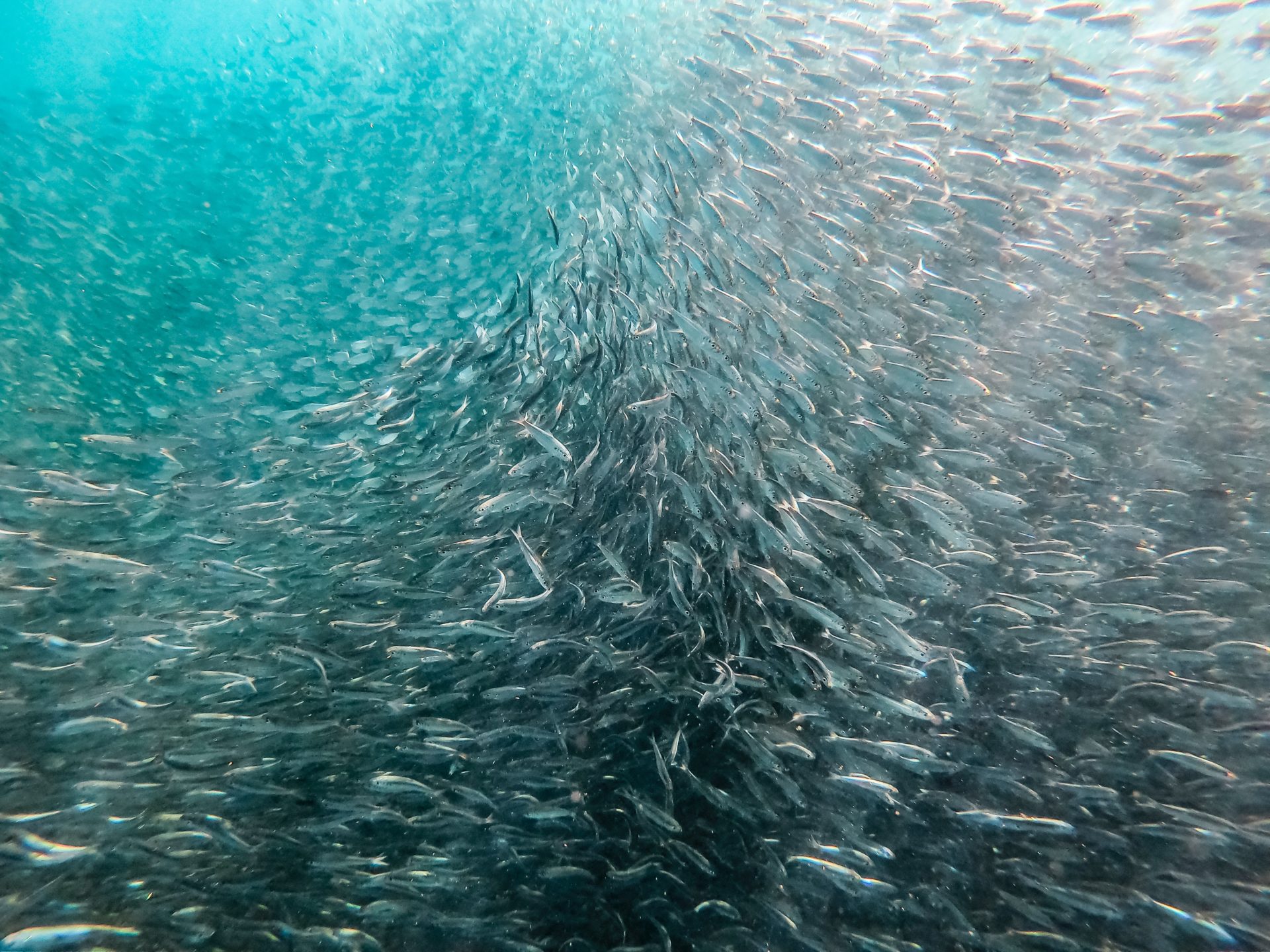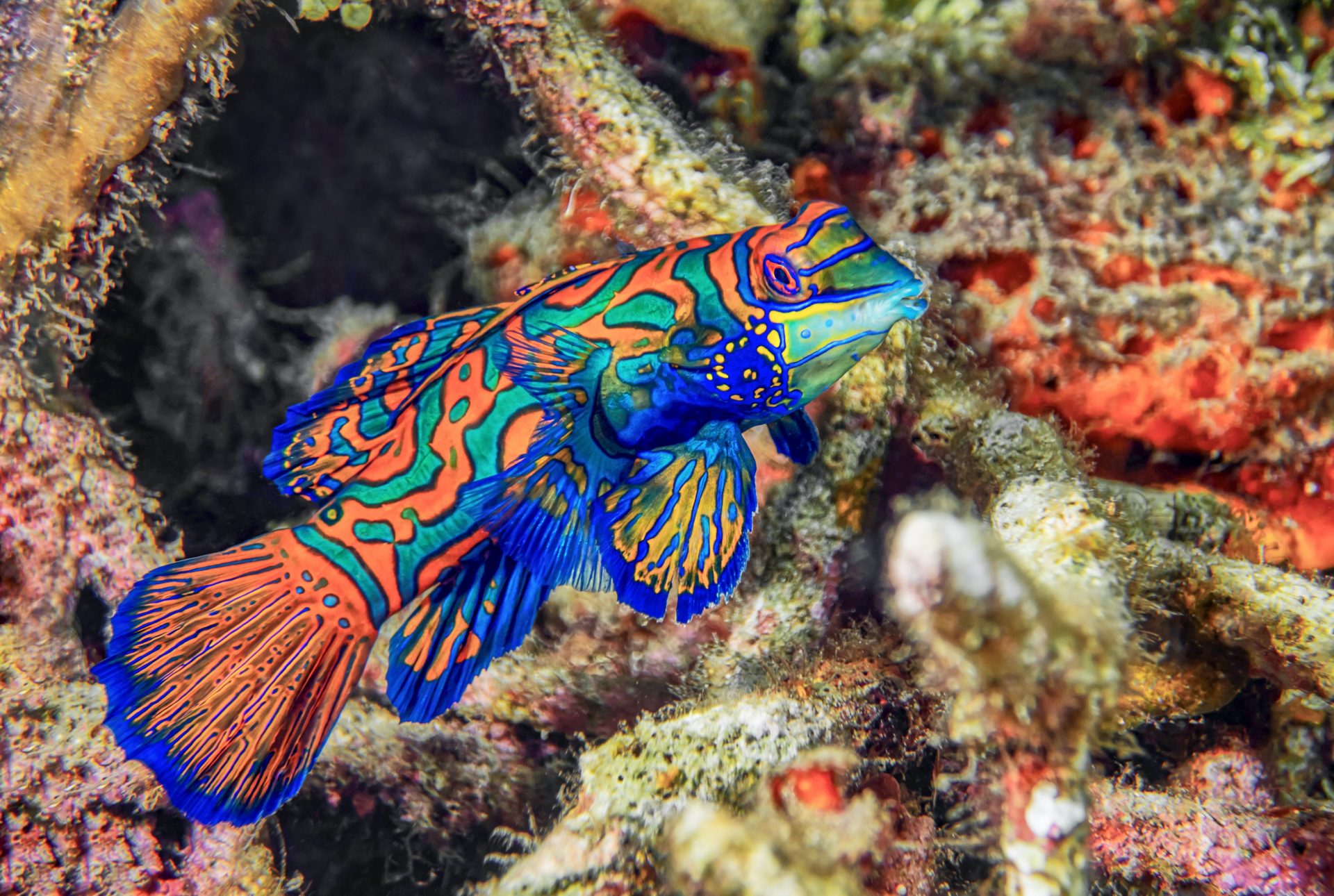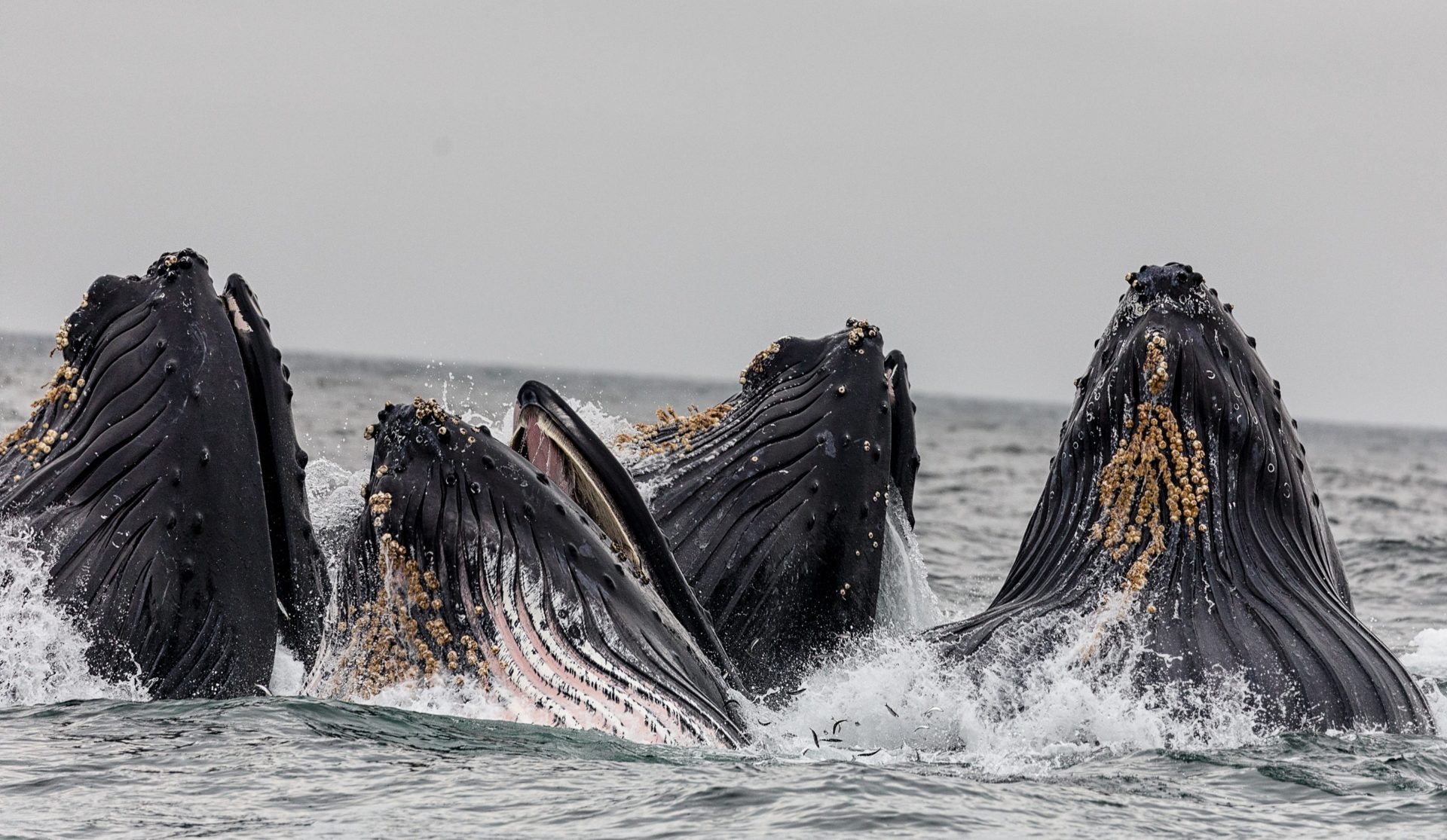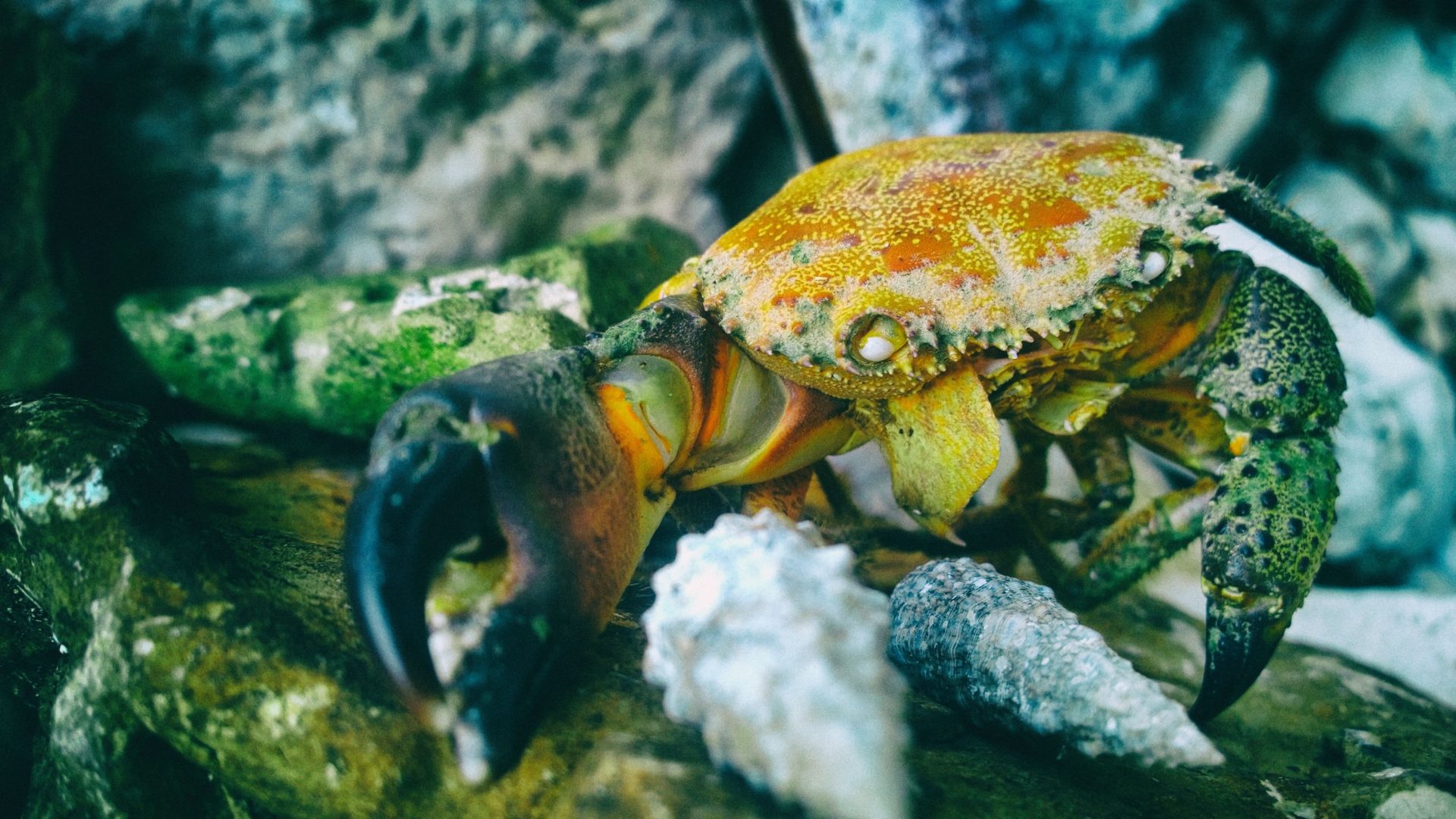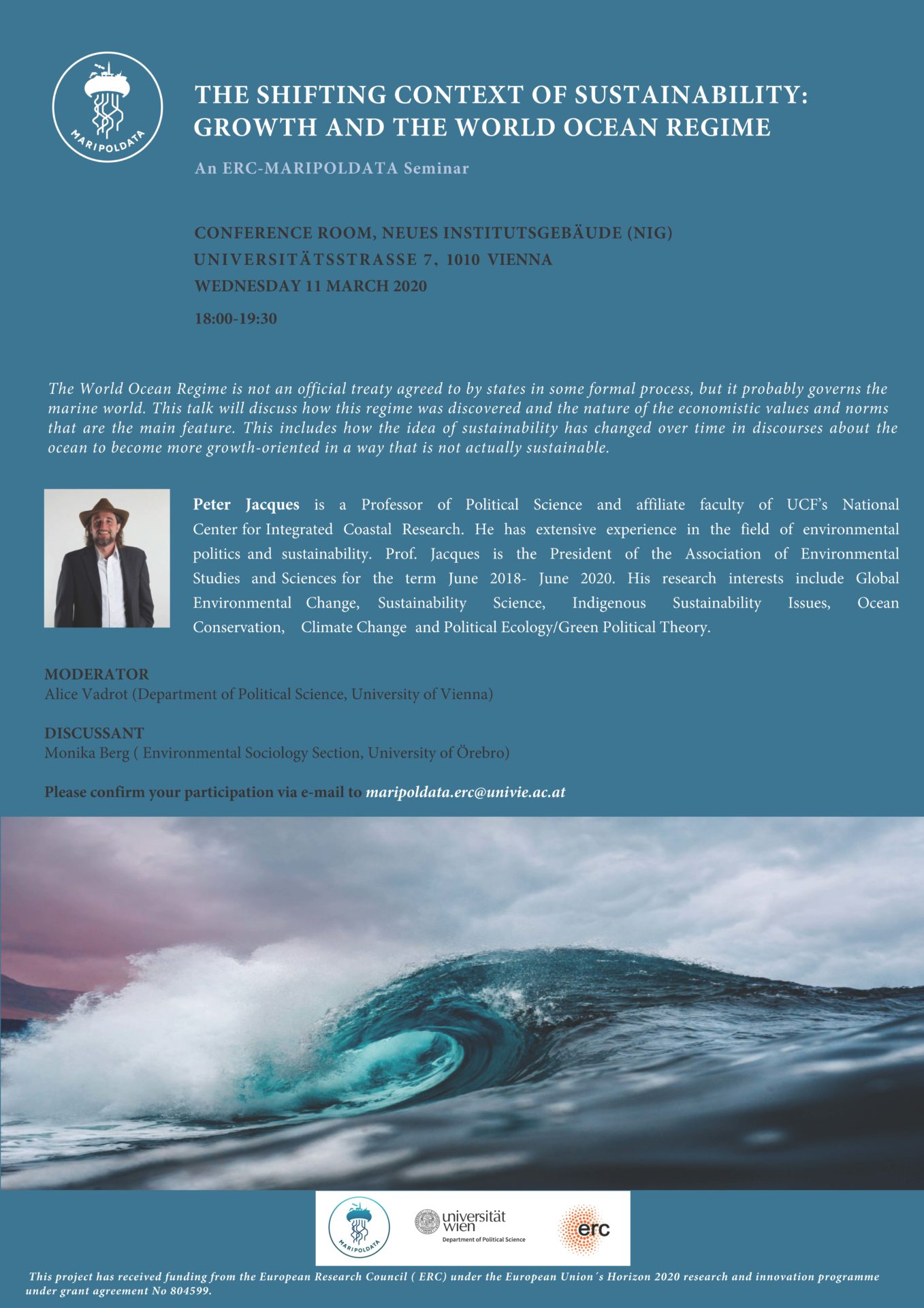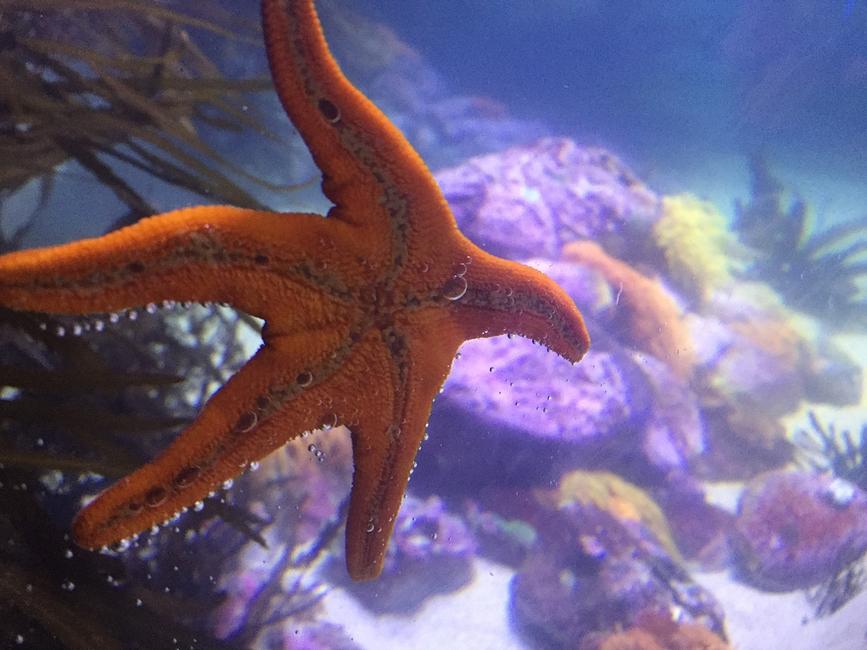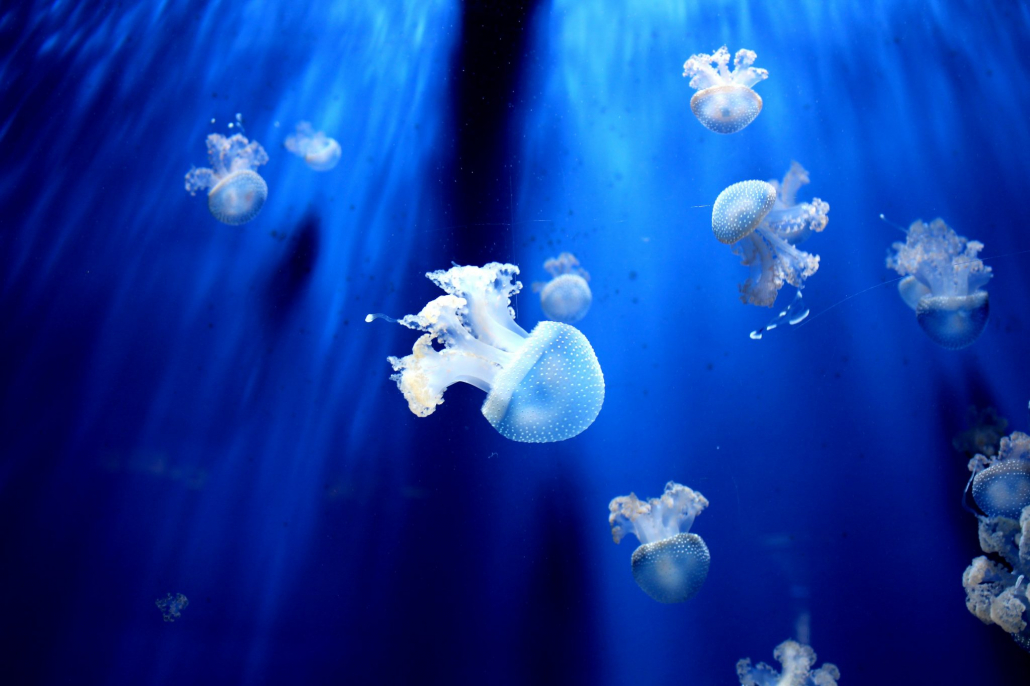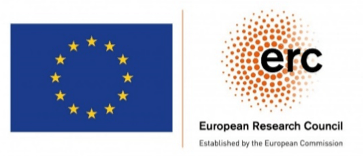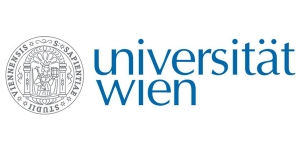The Future of global environmental negotiations: assessing the role of science and technology, 6.6.2024
We warmly invite you to share an evening with us at our closing event on the 6th of June 2024. This event will give us an opportunity to take stock of what we’ve achieved with our MARIPOLDATA research project, but also to look to the future and what it has to offer. We are looking very much forward to having you and kindly ask everyone to register themselves at the link provided below the program.
Warm regards,
Alice (Vadrot) and the MARIPOLDATA Team
WHEN: 6.6.2024 17:00 CET
WHERE: Theatersaal der Österreichischen Akademie der Wissenschaften, Sonnenfeldgasse 19, 2. Stock,1010 Wien and online
You are all kindly invited to join the event on-site or online and pass the invitation to friends and colleagues.
Abstract: Global environmental negotiations have become central sites for studying the interaction between politics, power, and environmental degradation. They provide legitimate frameworks for states to negotiate environmental protection measures and for scientists to exercise influence. By assembling diverse actors within the highly structured setting of international diplomacy, environmental negotiations set the stage for recognizing legitimate voices in global environmental politics, including those of scientists and other knowledge holders. This event will problematize the future of global environmental negotiations and critically assess the role of science, knowledge, and technology within this context. Experts from research and practice will reflect on current developments in the areas of biodiversity, ocean protection, and climate change and discuss specific avenues for strengthening the role of environmental knowledge for international cooperation and equitable sustainable futures.
Program:
17:00 – 17:15 |Reception
17:15 – 17:45 |Opening
Manuela Baccarini | Vice Rector for Research and International Affairs, University of Vienna
Christian Sturmbauer | Professor for Zoology and Evolutionary Biology, University of Graz & Austrian Academy of Sciences (ÖAW)
Gerhard Herndl | Professor of Marine Biology, University of Vienna & Austrian Academy of Sciences (ÖAW)
17:45 – 18:15 | How Science Shapes Environmental Policy: A Multi-Sited Approach
Alice Vadrot | Associate Professor for International Relations and the Environment, University of Vienna & Member of the Young Academy of the Austrian Academy of Sciences (ÖAW)
18:15 – 19:00 | Roundtable – Can Science and Technology Fix the Future of Global Environmental Negotiations?
Gabriele Göttsche-Wanli | Former Director of the Division for Ocean Affairs and the Law of the Sea at the United Nations
Tilde Krusberg | Researcher, Stockholm Resilience Centre, Stockholm University
Gabriele Obermeyer | Austrian Federal Ministry for Climate Action, Environment, Energy, Mobility, Innovation and Technology (BMK)
Katharina Rogenhofer | Board Member & Spokesperson, KONTEXT Institut für Klimafragen
Piero Visconti | Biodiversity, Ecology, and Conservation (BEC) Research Group Leader, International Institute for Applied Systems Analysis (IIASA)
19:00 – 19:30 | Q&A
19:30 | Food and drinks
MARIPOLDATA Ocean Seminar Series
The world’s oceans are home to prestige ecosystems and marine biodiversity. The majority of the oceans are not under the jurisdiction of any state. Therefore, regulations to protect and use the ocean’s resources and space need to be agreed on an international level. The United Nations are currently negotiating a legally binding agreement for the conservation and sustainable use of marine biodiversity in areas beyond national jurisdiction (BBNJ) to close gaps in the existing institutional frameworks and set regulations for the protection and further exploitation of common ocean resources.
The monthly MARIPOLDATA Ocean Seminar Series offer a virtual space to get information about timely ocean governance issues, through presentations by international experts from academia, governments, and civil society. They cover recently published political science peer-reviewed articles, policy briefs and other publications relevant to global ocean governance.
Throughout the year, the Ocean Seminar Series will combine input from academics and practitioners on a range of ocean topics, including the ongoing negotiations for the conservation and sustainable use of marine biodiversity beyond national jurisdiction (BBNJ) and specific package elements (Marine Genetic Resources, Area-Based Management Tools, Environmental Impact Assessments, and Capacity Building and Transfer of Marine Technology), and overarching ocean governance topics, such as Ocean pollution, Ocean and Climate Change Nexus, Maritime Crime etc.
Aims:
• provide room for debate on recent publications in the field of ocean science and politics with specific emphasis on ocean protection, sustainable development and SDG14
• facilitate dialogue between different disciplines and research areas and
• increase interdisciplinary exchange between scholars interested in ocean-related issues.
The ocean Seminars are open to anyone interested in global environmental governance and ocean issues from all academic backgrounds.
Target Group:
The sessions are meant for researchers of ocean/climate/biodiversity/earth system governance-related fields from natural and social sciences and law. The Ocean Seminars are interesting for policymakers from international UN processes or regional and local institutions regarding ocean governance, representatives of non-governmental organizations interested in protecting our planet, and supporters of a sustainable blue economy.
Anyone interested in ocean-related issues and research and in reading and discussing recent literature in the field. All disciplines are welcome.
Apart from the monthly information input, they constitute a space for an exchange of most recent scientific findings, the continuation of academic debates, the formation of a strong network of people with various backgrounds, and hopefully the development of new ideas to encourage a healthy way of living in harmony with the ocean.
How to join?
If you are interested, please contact the MARIPOLDATA Team (maripoldata.erc@univie.ac.at) indicating your name and institution to be added to the MARIPOLDATA Ocean Seminar Series´mailing list and receive the dates for upcoming meetings and the reading material.
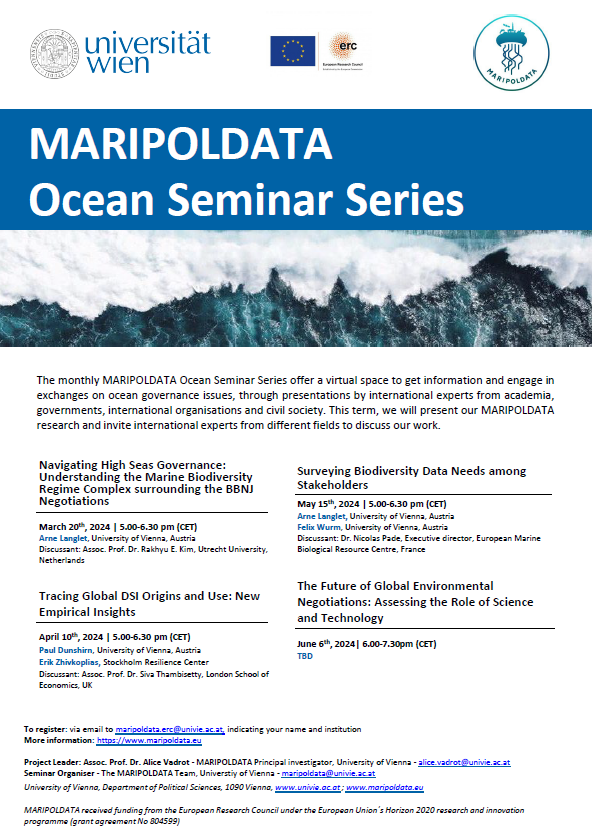
PAST EVENTS
Surveying Biodiversity Data Needs among Stakeholders. Ocean Seminar, 15.05.2024
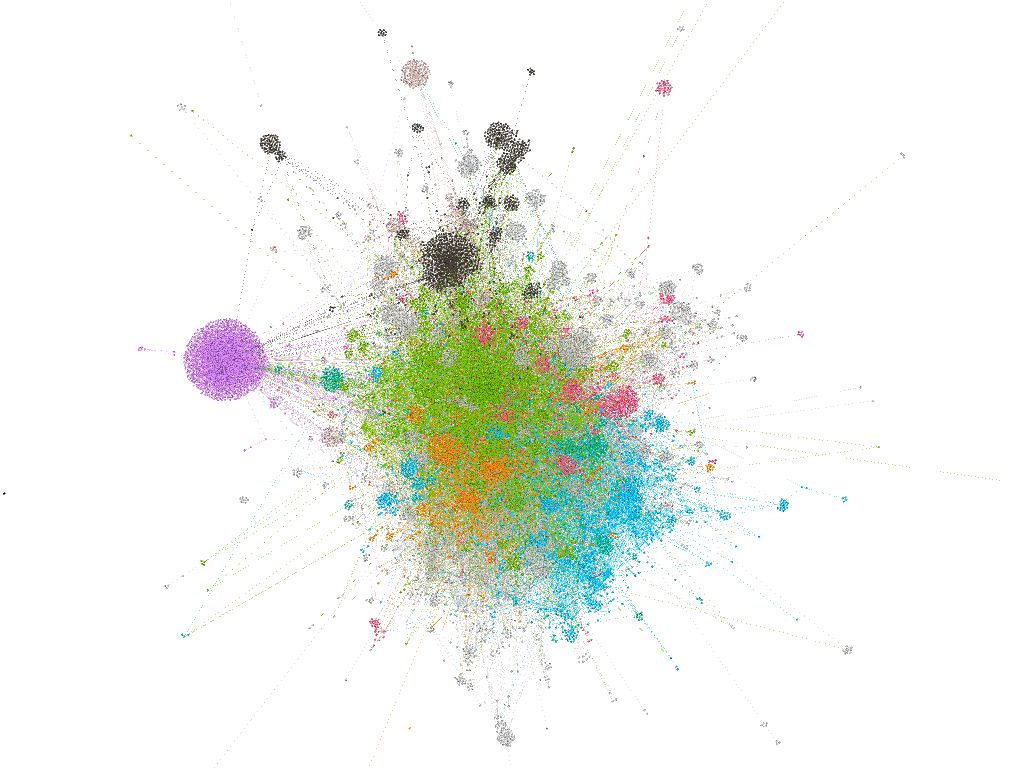
Date: Wednesday, May 15th, 2024
Time: 05:00-06:30pm (CET)
Venue: Online (Zoom)
Speakers: Arne Langlet, Postdoctoral Researcher at the MARCO-BOLO research project, University of Vienna, Austria.
Felix Wurm, Student Assistant at the MARCO-BOLO research project, UNiversity of Vienna, Austria.
Discussant: Nicolas Pade, Executive Director of the European Marine Biological Resource Centre (EMBRC-ERIC).
Abstract: Biodiversity monitoring is an essential component of understanding and managing ecosystems. Diverse monitoring infrastructures and initiatives have been put in place, encompassing a diverse range of ecosystems, spanning from marine and freshwater to terrestrial habitats. However, while monitoring systems, repositories and research infrastructures are proliferating, biodiversity monitoring as well as the its integration into policy-making is driven by diverse political, regional and epistemological dynamics. The MARCO-BOLO Project (MARine COastal BiOdiversity Long-term Observations) aims to address these by optimizing and improving methods, and further innovating technologies for biodiversity observations, with the goal to strengthen biodiversity observation in support of decision making. In order to contribute to the projects goal to engage stakeholders, the University of Vienna conducted a survey to better understand data users’ and stakeholders’ profiles, their data needs and experienced challenges.This Ocean Seminar presents and discusses some of the key findings of the survey which feed into a MARCO-BOLO report and a publication. It describes the different profiles of stakeholders highlighting that respondents often experienced similar challenges including inconsistencies in data, accessibility issues, and inadequate metadata quality. The seminar discusses the practices, cultures and challenges of biodiversity monitoring identifying a need for maps, and effective tools and methods to integrate data and the role of stakeholder engagement in providing input from scientific research in policy-making.
Tracing Global DSI Origins and Use: New Empirical Insights. Ocean Seminar, 10.04.2024.
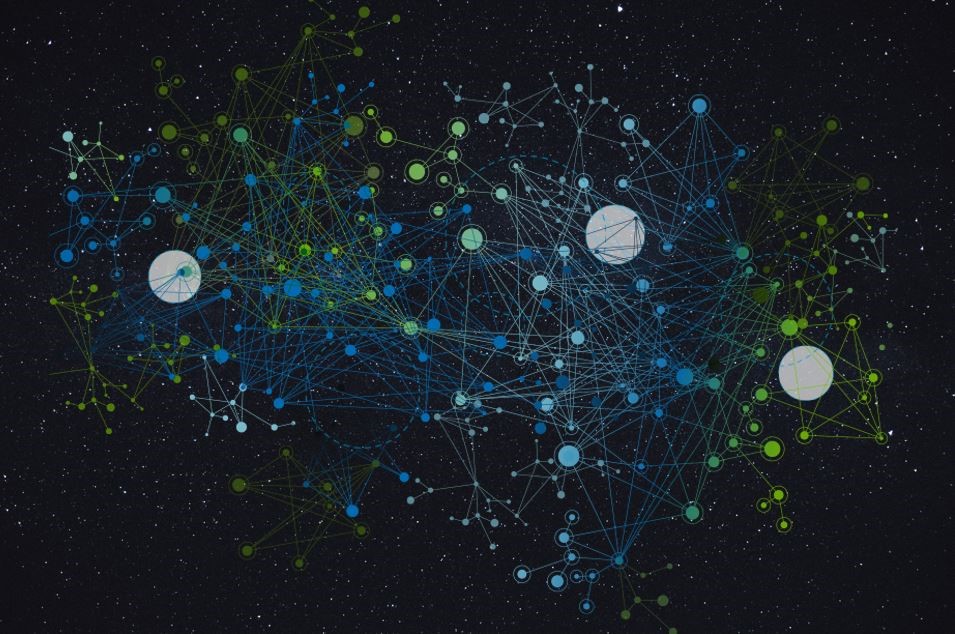
Date: Wednesday, April 10th, 2024
Time: 05:00-06:30pm (CET)
Venue: Online (Zoom)
Speakers: Paul Dunshirn, PhD Student at MARIPOLDATA, University of Vienna.
Erik Zhikovplias, PhD Student at the Stockholm Resilience Center.
Discussant: Siva Thambisetty, Associate Professor of Law at the Law School of LSE.
The recording of the session is available here (Password: Ocean_seminar_5).
Navigating High Seas Governance: Understanding the Marine Biodiversity Regime Complex surrounding the BBNJ Negotiations. Ocean Seminar, 20.03.2024.
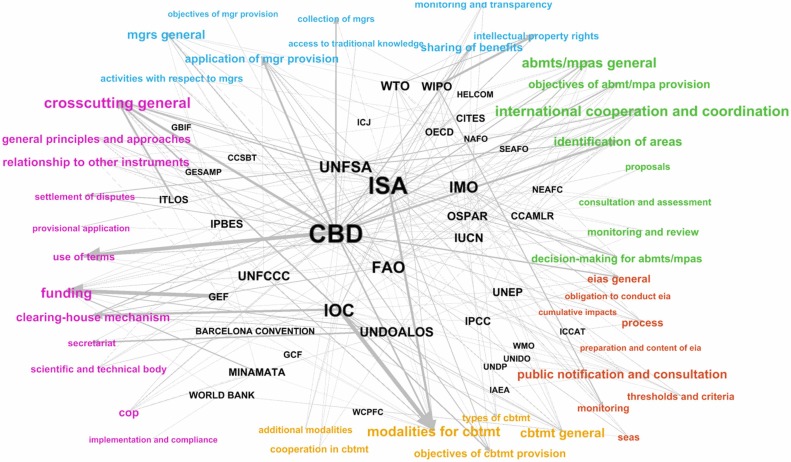
International Organizations connected to BBNJ Treaty provisions. From: Langlet, A., & Vadrot, A. B. M. (2023). Not ‘undermining’ who? Unpacking the emerging BBNJ regime complex. Marine Policy, 147, 105372.
Date: Wednesday, March 20th, 2024
Time: 05:00-06:30pm (CET)
Venue: Online (Zoom)
Speakers: Arne Langlet, former PhD Student at MARIPOLDATA, University of Vienna.
Discussant: Rakhyun Kim, Utrecht University, Netherlands
This seminar will explore the regime complex surrounding the BBNJ negotiations by identifying the array of bodies and how they interacted during the negotiations. It will further discuss the apparent politics that shape the regime complex.
The recording of the session is available here (Password: Ocean_seminar_4).
Negotiating knowledge or marine protected areas? Struggles in the Convention on Biological Diversity. Ocean Seminar, 21.02.2024
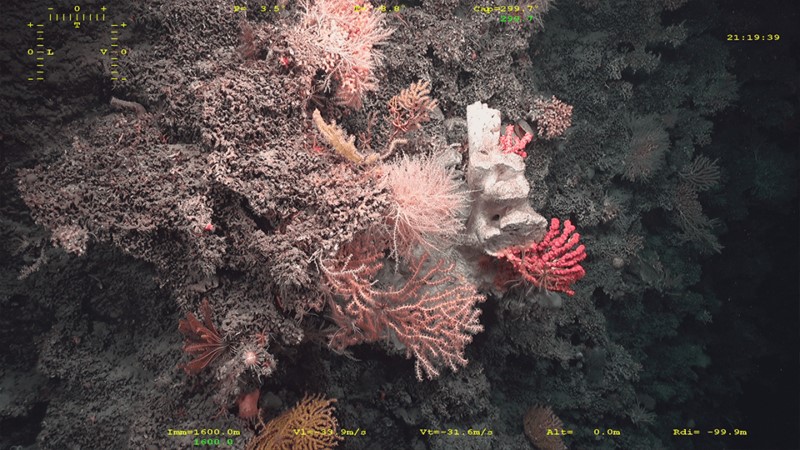
Research practices of BEEP to study deep-sea ecosystems: deep coral reef in the Bay of Biscay ©ChEReef – Ifremer (2022)
Date: Wednesday, February 21rst, 2024
Time: 05:00-06:30pm (CET)
Venue: Online (Zoom)
Speakers: Silvia C. Ruiz-Rodríguez, PhD Student and Predoc Assistant, University of Vienna.
Discussant: Lisa Campbell, Duke University, USA
Social scientists have not yet studied how experts identify EBSAs. However, this is needed to untangle the practices of cooperation and competition that shape international marine biodiversity protection. Our research studies how EBSAs were identified by building on 24 interviews with participants of the EBSA regional workshops. It focused on four particular workshops – the Southern Indian Ocean, the Arctic region, the Baltic Sea, and the Northeast Atlantic.
This ocean seminar will shed light on the practices that workshop participants performed to identify and negotiate EBSA boundaries. Furthermore, it will elucidate the role of EBSAs in international efforts to protect marine biodiversity. As a renowned expert on marine governance and marine issues in the CBD, Lisa Campbell will discuss our research.
If you would like to register to the seminar, please send an email to maripoldata.erc@univie.ac.at
The Oral History of Marine Biodiversity. Ocean Seminar, 23.01.2024
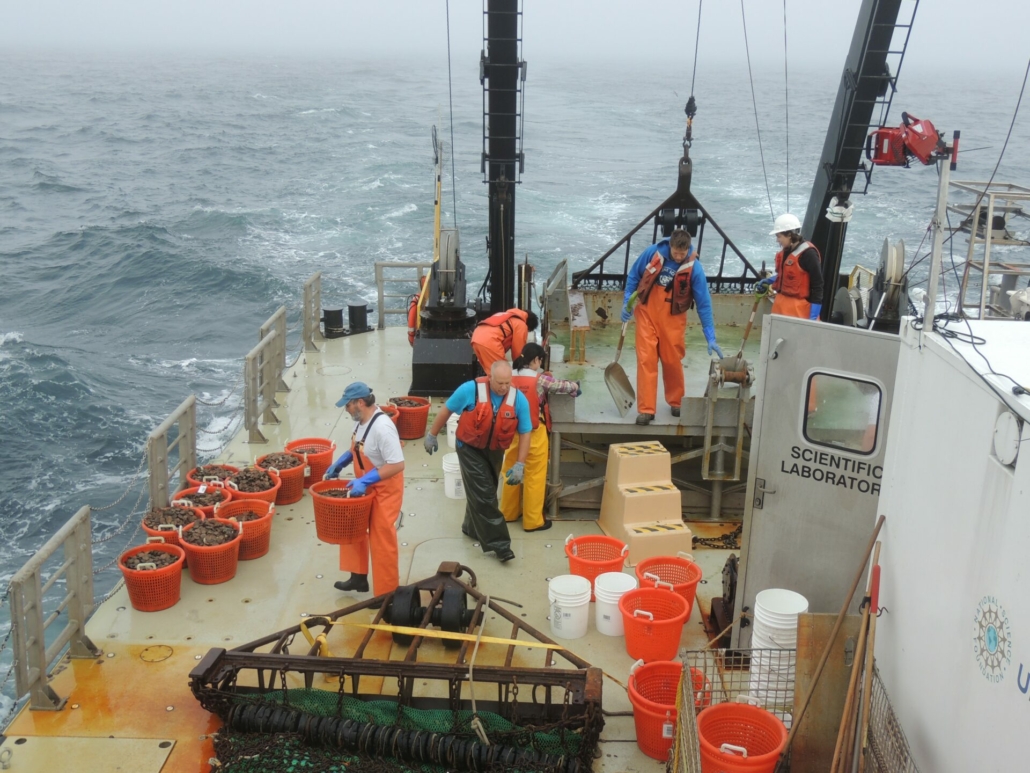
Photo credits: NOAA on Unplash
Date: Tuesday, January 23rd, 2024
Time: 05:00-06:30pm (CET)
Venue: Online (Zoom)
Speakers: Alice Vadrot, Principal Investigator, ERC Project MARIPOLDATA
Discussant: Lisa Levin, University of California, San Diego
If you would like to register to the seminar, please send an email to maripoldata.erc@univie.ac.at
Pathways of Scientific Input into Intergovernmental Negotiations: the BBNJ case. Ocean Seminar, 05.12.2023

Date: Tuesday, December 5th, 2023
Time: 05:00-06:30pm (CET)
Venue: Online (Zoom)
Speakers: Ina Tessnow-vonWysocki, PhD student, ERC Project MARIPOLDATA
Discussant: Christian Prip, Senior researcher at the Fridtjof Nansen Institute Norway
Ina Tessnow-von Wysocki is a PhD student in the department of Political Science at the University of Vienna. After her work experiences in climate and foreign policy in the German Federal Government, NGOs and think tanks, she specialised in International Cooperation on environmental issues. In her work as a PhD student at MARIPOLDATA, she has focussed on science-policy interfaces for ocean protection.
If you would like to register to the seminar, please send an email to maripoldata.erc@univie.ac.at
Zooming-into agreement-making: Tracing the BBNJ negotiations with the MARIPOLDATAbase. Ocean Seminar, 08.11.2023
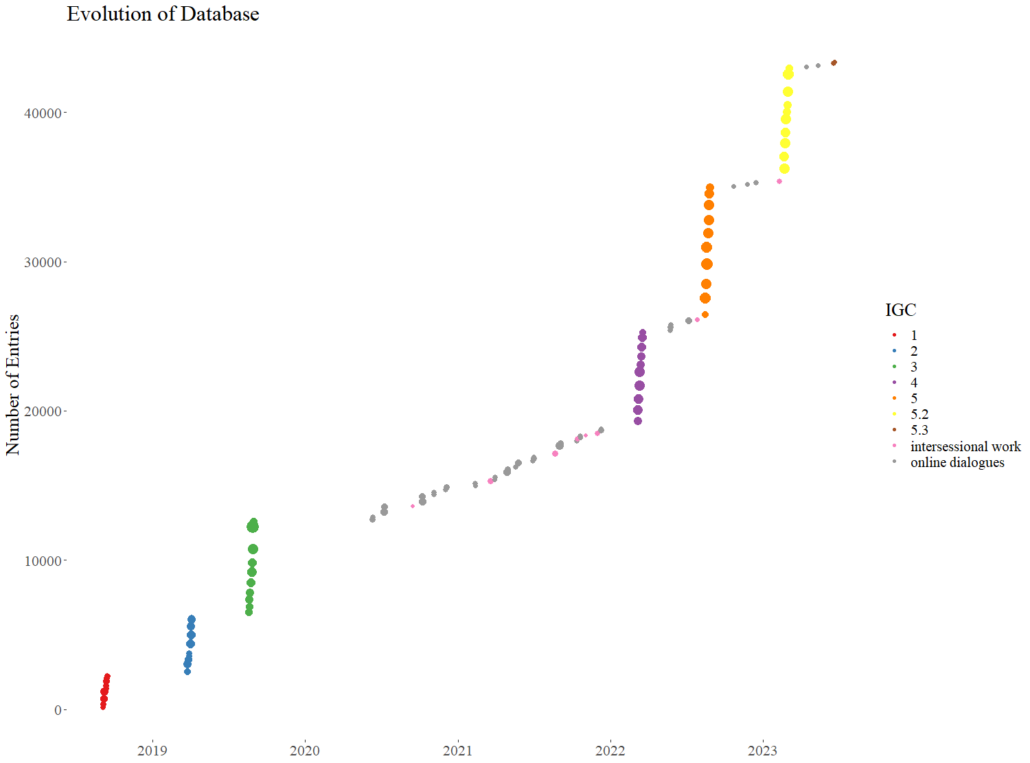 Date: Wednesday, November 8th, 2023
Date: Wednesday, November 8th, 2023
Time: 05:00-06:30pm (CET)
Venue: Online (Zoom)
Speakers: Arne Langlet, PhD student, ERC Project MARIPOLDATA, University of Vienna, Simon Fellinger, ERC Project MARIPOLDATA, University of Vienna, Assoc. Prof. Dr. Alice Vadrot, Principal Investigator, ERC Project Maripoldata, University of Vienna
Discussant: Prof. Jean-Frédéric Morin, Université Laval, Canada
Jean-Frédéric Morin holds the Canada Research Chair in International Political Economy and is Full Professor of political science at Université Laval (Québec City, Canada). His research looks at how international institutions innovate, interact and evolve. Empirically, he looks at institutions in the fields of trade, investment, intellectual property, outer space, and environmental governance. Jean-Frédéric is a Fellow of the Trudeau Foundation, Member of the Royal Society of Canada College and Senior Fellow at the Centre for International Governance Innovation. His publications have appeared in journals like International Studies Quarterly, European Journal of International Relations, Review of International Organizations, Global Environmental Politics, and Review of International Political Economy.
Did you miss the seminar? Watch a recording of the session here. (Kenncode: C2YX2Uc$)
Mapping the governance system of space sustainability: Insights from a new dataset. 31.10.2023
Date: Tuesday, 31rst of October
Time: 05:30-7:00pm (CET)
Hybrid event: Hörsaal 2, Oskar-Morgenstern-Platz 1, 1090 Wien, or via Zoom. No registration required.
Speaker: Prof. Jean-Frédéric Morin, Université de Laval
Discussant: Ass.-Prof. Nina Klimburg-Witjes
Abstract: This presentation maps the governance system of space sustainability. It shares preliminary findings from a comprehensive census of 1,600 space organizations, with detailed data on their history, size, location and activities. It also presents patterns found in 1,500 institutional arrangements concluded among these organizations, including memorandums of understanding, resolutions, contacts, and treaties. In doing so, this presentation provides a bird’s-eye view of the space governance system, beyond the few major players and multilateral institutions that frequently make the headlines. Five key findings will be discussed : (1) The space industry gradually emerged out of symbiotic relations with the public sector; (2) Yet, homophilic preferences create a regulatory divide between public and private organizations; (3) This fragmentation benefits historically powerful actors, such as the United States; (4) Fragmentation is associated with a low degree of attention to the “commons” and to “environmental externalities”; (5) Hybrid organizations have the potential to bridge different clusters and facilitate systemwide self-management.

Jean-Frédéric Morin holds the Canada Research Chair in International Political Economy and is Full Professor of political science at Université Laval (Québec City, Canada). His research looks at how international institutions innovate, interact and evolve. Empirically, he looks at institutions in the fields of trade, investment, intellectual property, outer space, and environmental governance. Jean-Frédéric is a Fellow of the Trudeau Foundation, Member of the Royal Society of Canada College and Senior Fellow at the Centre for International Governance Innovation. His publications have appeared in journals like International Studies Quarterly, European Journal of International Relations, Review of International Organizations, Global Environmental Politics, and Review of International Political Economy.
Book presentation: Conducting Research on Global Environmental Agreement-Making - Ocean Seminar, 11.10.2023
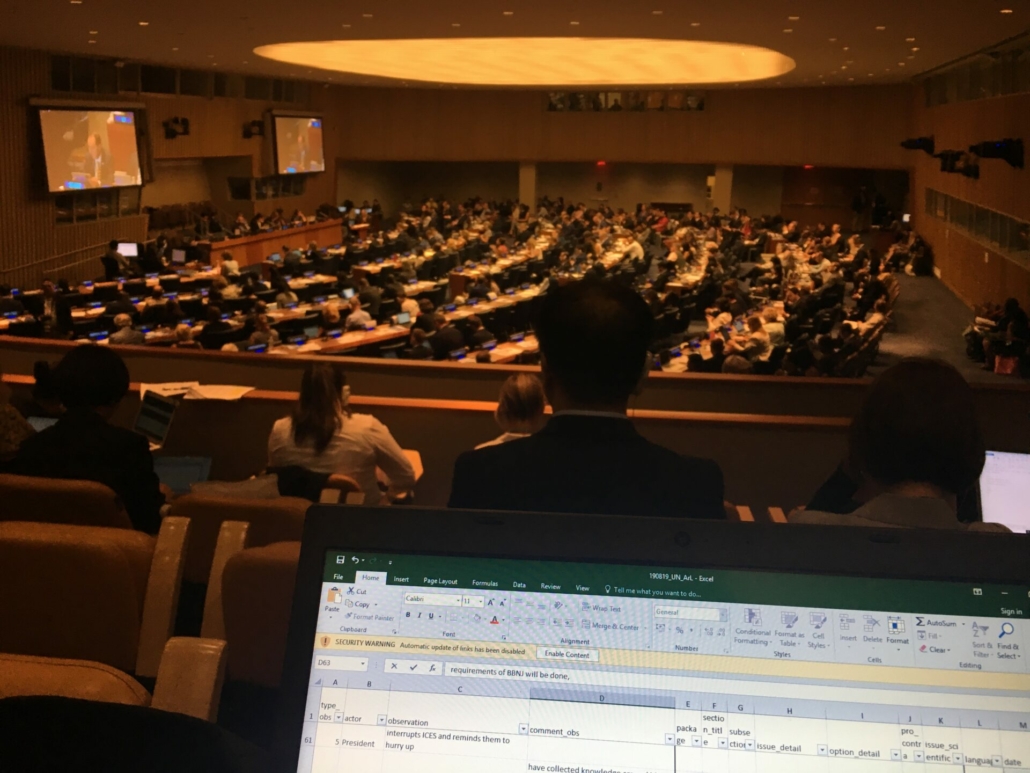 Date: Wednesday, October 11th, 2023
Date: Wednesday, October 11th, 2023
Time: 05:00-06:30pm (CET)
Venue: Online (Zoom)
Speakers: Dr. Hannah Hughes, Senior Lecturer in International Politics and Climate Change at Aberystwyth University, United Kingdom
Assoc. Prof. Dr. Alice Vadrot, MARIPOLDATA Principal investigator, University of Vienna
Discussant: Arne Langlet, PhD student, MARIPOLDATA , Vienna University & Ina Tessnow-von Wysocki, PhD student, MARIPOLDATA , Vienna University
Hannah Hughes´ research and teaching is motivated by a deep concern for the state of the environment and the political, economic and social institutions that produce and sustain degrading human and planetary relations. She has explored this through the role and relationship between knowledge, power and environmental action in the Intergovernmental Panel on Climate Change (IPCC) and collaboratively with Dr Alice Vadrot in the the Intergovernmental Platform on Biodiversity and Ecosystem Services (IPBES), conceptualising these global assessment bodies as sites where negotiations of climate change and biodiversity start. Her research is informed by the sociology of Pierre Bourdieu and she is particularly interested in the reproduction of social order and the methodological innovation and the ethical stakes of undertaking this form of scholarship.
Alice Vadrot’s work addresses the role of knowledge and science in global environmental politics. She has conducted extensive research on the Intergovernmental Platform on Biodiversity and Ecosystem Services (IPBES) and developed the concept of “epistemic selectivities”, which she uses to describe and understand the processes that lead to epistemic authority, legitimacy and scientific and political self-evidence in global environmental politics. Vadrot is the author of “The Politics of Knowledge and Global Biodiversity” (Routledge, 2014) and editor of several special issues, research articles and editorials.
Her ERC project MARIPOLDATA develops and applies a new methodological approach for grounding the analysis of science-policy interrelations in empirical research.
To register, send an email to maripoldata.erc@univie.ac.at, indicating your name and institution
The marine manager portal and how it could assist in the implementation of the BBNJ agreement, with Tim White - Ocean Seminar, 08.03.2023
Time: 05:00-06:30pm (CET)
Venue: Online (Zoom)
Speaker: Dr. Tim White, Senior Manager, Global Fishing Watch
Discussant: Arne Langlet, PhD student, MARIPOLDATA , Vienna University
This presentation described how recent advances in satellite technology and artificial intelligence have rapidly expanded our ability to monitor global fisheries. It will highlight how clearer views of human activity at sea are being combined with animal tracking information to improve fisheries management and marine conservation.
"Is two weeks enough for an equitable and effective treaty design? Hurdles and gaps in the BBNJ process", with Elizabeth Mendenhall and Rachel Tiller - Ocean Seminar, 15.02.2023
Date: Wednesday, 15 February 2023
Time: 05:00-06:30pm (CET)
Venue: Online (Zoom)
Speakers: Elizabeth Mendenhall, Assistant Professor in the Marine Affairs Department at the University of Rhode Island, USA
Rachel Tiller, Chief Scientist at SINTED Ocean, Norway
Discussant: Silvia Ruiz-Rodríguez, PhD student, SOWI Doc, Vienna University
The next, and possibly final, round of the ‘Biodiversity Beyond National Jurisdiction’ (BBNJ) negotiations will begin on February 20th, with high hopes for completion of a strong treaty. But significant issues remain unresolved across the package of issues, especially in regards to Environmental Impact Assessments (EIAs), Marine Genetic Resources (MGRs), and the Common Heritage of Mankind principle. And major decisions have yet to be made about the institutional architecture of the treaty, including central topics such as funding, and the decision-making mandates of the Conference of Parties, Scientific and Technical Body, and assorted committees. This talk will review the major unresolved issues in the draft treaty, and the expected lines of contention at the resumed IGC-5. We will also identify particular gaps in the emerging treaty design, and their implications for implementation and effectiveness. There is significant pressure to finalize the treaty in early 2023, but there is a risk of choosing a fast treaty over a well-designed one. We examine the foundations of this urgency by considering which actors are pushing for which types of resolutions, and the degree to which negotiation modalities may influence the pace and pattern of the draft treaty’s development.
Elizabeth Mendenhall is an Assistant Professor in the Marine Affairs Department at the University of Rhode Island, where she also serves as the Graduate Program Director. Her PhD is in International Relations, and her research focuses on the drivers and mechanisms of change in the ocean governance regime. Her recent publications explore regime development in a wide range of areas, including: Biodiversity Beyond National Jurisdiction, restrictions on nuclear transit, flag and port state obligations in a pandemic, fisheries conflict, and marine plastic pollution.
Rachel Tiller is a Chief Scientist at SINTEF Ocean (Norway) in the Department of Fisheries and New Biomarine resources. She is also the Director of the key strategic research area of biodiversity and area use at SINTEF, and she has published extensively on the emergent patterns and trends in the Biodiversity Beyond National Jurisdiction negotiations. Her PhD is in Political Science, and she has interdisciplinary experience around sustainability analysis, usergroup interactions, biodiversity challenges and governance analysis.
Did you miss the seminar? Watch a recording of the session here (Passcode: d8g$E*+f)
"Climate Change and the Deep Sea: Science-Policy perspectives" with Lisa Levin - Ocean Seminar, 18.01.2023
Date: Wednesday, 18 January 2023
Time: 05:00-06:30pm (CET)
Venue: Online (Zoom)
Speaker: Lisa Levin, Distinguished Professor at the Scripps Institution of Oceanography, USA
Discussant: Dr. Krystel Wanneau, Postdoctoral researcher, ERC Project MARIPOLDATA
The deep ocean (>200 m) plays a critical role in climate mitigation, removing heat and CO2 from the atmosphere. This function also causes warming, acidification, deoxygenation and changing food supply in deep waters. These stressors interact with each other and with other ocean parameters such as light and nutrients to modify ocean life. The consequences for deep-sea marine ecosystems and their ecological functions and services are likely to be substantial. These may include redistribution and habitat compression of species including some with commercial value or trophic significance, loss of habitat and support values via effects on foundation species, changes in biodiversity, altered food web structure and more. Proposed ocean-based climate interventions may compound or exacerbate these threats. These changes will also intersect with physical, chemical and biological disturbance imposed by increasingly deeper extraction of oil and gas, living resources and seabed minerals, affecting carbon services, ocean resilience and sustainability. I will discuss critical scientific knowledge required for maintaining ocean sustainability and how these challenges are treated (or not) in global assessments. Major opportunities for mainstreaming climate resilience and carbon conservation in ocean management and international policy instruments will be highlighted.
Lisa Levin is a Distinguished Professor Emerita at the Scripps Institution of Oceanography, University of California, San Diego. She served as Director of the Center for Marine Biodiversity and Conservation and Oliver Chair at Scripps from 2011-2017. Levin’s research interests include biodiversity and climate change impacts on deep-sea continental margin, and the application of deep-sea science to policy. Levin’s deep-sea research has been conducted on over 50 expeditions to the margins of the Pacific, Indian and Atlantic Oceans using ships, submersibles, ROVs and AUVs to observe, sample and conduct experiments. Dr. Levin is co-founder and co-lead of the Deep-Ocean Stewardship Initiative (DOSI) and the Deep Ocean Observing Strategy (DOOS) and contributes to IPCC reports and World Ocean Assessments.
Did you miss the seminar? Watch a recording of the session here (Passcode: r8=WEn%e)
"Science diplomacy in marine biodiversity negotiations: Perspectives from the South" with Andrei Polejack - Ocean Seminar, 07.12.2022
Date: Wednesday,7 December 2022
Time: 05:00-06:30pm (CET)
Venue: Online (Zoom)
Speaker: Dr. Andrei Polejack, Senior advisor for the Brazilian Ministry of Science, Technology and Innovation
Discussant: Dr. Krystel Wanneau, Postdoctoral researcher, ERC Project MARIPOLDATA
Have you ever wondered how science can drive international biodiversity diplomatic negotiations? If you did, you probably thought of it from your own perspective, which is greatly shaped by where you were born, in which body you exist, what type of education you had, and how you access science and scientific knowledge. Now, it is intriguing to understand how your peers from different genders, geographies, and educational backgrounds perceive the very same influence of science in international negotiations (among other things, of course). In this lecture, I intend to present different perspectives on ocean science diplomacy, as a result of my research with government and science stakeholders in the Atlantic. I do so from my own positionality, that is, from my perspective as a Brazilian white male with decades of experience laboring in the public sector on ocean affairs. I expect attendees to share their own experiences and thoughts, in a way of co–creating what ocean science diplomacy means. Welcome on board!
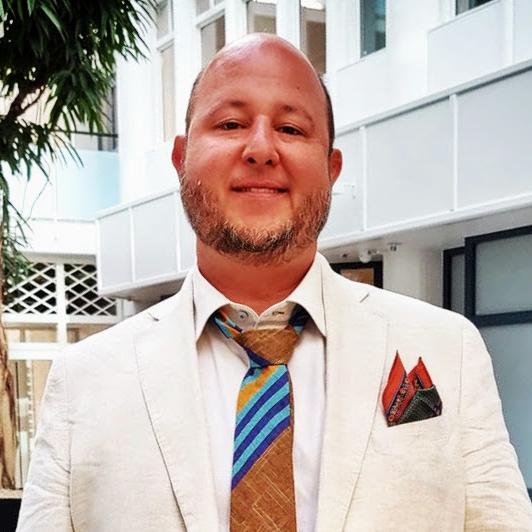 Andrei Polejack (he/his) is a senior advisor for the Brazilian Ministry of of Science, Technology and Innovation. PhD in Maritime Affairs from the WMU-Sasakawa Global Ocean Institute of the World Maritime University, Sweden and MSc. in Evolutionary Ecology from Universidade de Brasília, Brasil. Former Coordinator for Oceans, Antarctica and Geosciences in Brazil, used to coordinate the national ocean and polar research programs, providing technical advice to governance, formulating and implementing public policies, and negotiating international agreements, among many other duties. As a transdisciplinary researcher, Andrei is interested in Ocean Science Diplomacy as a field of study, seeking to understand the role of science and scientists in international ocean affairs, along with the political sphere of power dynamics and interests in the marine realm. Theoretically passionate about post- and de-colonial reasoning applied to international relations and its many ways of linking with ocean science. A Latino soul, proud father of three of the best humans, and a lover of dogs, cats, sea puffins, beer, and fikas.
Andrei Polejack (he/his) is a senior advisor for the Brazilian Ministry of of Science, Technology and Innovation. PhD in Maritime Affairs from the WMU-Sasakawa Global Ocean Institute of the World Maritime University, Sweden and MSc. in Evolutionary Ecology from Universidade de Brasília, Brasil. Former Coordinator for Oceans, Antarctica and Geosciences in Brazil, used to coordinate the national ocean and polar research programs, providing technical advice to governance, formulating and implementing public policies, and negotiating international agreements, among many other duties. As a transdisciplinary researcher, Andrei is interested in Ocean Science Diplomacy as a field of study, seeking to understand the role of science and scientists in international ocean affairs, along with the political sphere of power dynamics and interests in the marine realm. Theoretically passionate about post- and de-colonial reasoning applied to international relations and its many ways of linking with ocean science. A Latino soul, proud father of three of the best humans, and a lover of dogs, cats, sea puffins, beer, and fikas.
Did you miss the seminar? Watch a recording of the session here (Passcode: @Sj1ZR*f )
"Field stations, research vessels. Physical communication at the heart of science" with Anna-Katharina Hornidge - Ocean Seminar, 30.11.2022
Date: Wednesday, 30 November 2022
Time: 05:00-06:30pm (CET)
Venue: Online (Zoom)
Speaker: Prof. Dr. Anna-Katharina Hornidge, Director of the German Institute of Development and Sustainability (IDOS) & Professor at Bonn University, Germany
Discussants: Assoz. Prof. Dr. Alice Vadrot and Dr. Krystel Wanneau, ERC Project MARIPOLDATA
Epistemic work in research teams consists largely of communication. Ideally, communication is a form of data- and theory-based scientific argumentation, i.e. a communicative cooperation and opposition, in which the good argument, experience, reputation and acquired position in the research field are significant factors when it comes to the power to assert one’s view of things. Physical strength or physical attractiveness of the participating scientists explicitly have no place there. Here we investigate the question of whether, in certain spaces and certain situations, communication with the (strong and/or attractive) body implicitly plays a role in processes of scientific knowledge production. In other words: Does communication with the body, i.e. communication in which unmistakable physical strength or physical attractiveness is brought into play, have an effect on the production of scientific knowledge itself, does it guide and shape it? And to what extent is this relevant at a time when almost all areas of large-scale research financed by Germany are gradually emigrating from the universities and being conducted in non-university, globally active research institutes – in ever larger international teams that are increasingly dependent on each other in their epistemic work and which rely on very expensive research infrastructures, laboratories, field stations and sometimes also on research ships? What role does communication with the body and the body power thus acquired play in processes of scientific knowledge production? These questions about the role of body power for epistemic work in science will be examined by means of two empirical data collections at two locations and in two forms of scientific knowledge production: an agricultural research station in northwest Uzbekistan and the research vessel Meteor on a cruise in the South Atlantic.
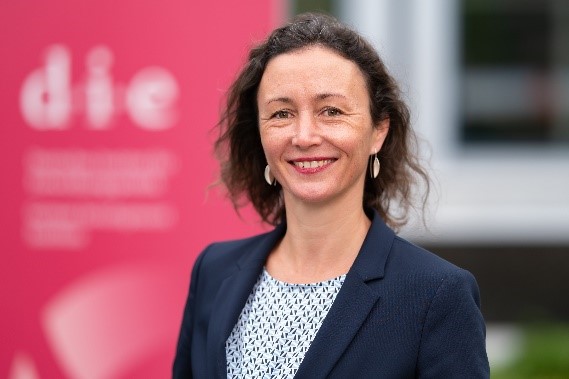 Prof. Dr. Anna-Katharina Hornidge is Director of the German Institute of Development and Sustainability (IDOS) and Professor for Global Sustainable Development at the University of Bonn. She holds a habilitation in development research from the University of Bonn, a PhD in Sociology from the Technical University of Berlin and the National University of Singapore and a Master’s Degree in Southeast Asian Studies from the University of Bonn. Before joining IDOS in March 2020, she was Professor of Social Sciences in the Marine Tropics at the University of Bremen and Head of Department of Social Sciences and of the research group ‘Development and Knowledge Sociology’ at the Leibniz Center for Tropical Marine Research (ZMT). From 2006 to 2015, she worked as Senior Researcher for the Centre for Development Research (ZEF). In her research, Ms Hornidge focuses on the role of different types of knowledge in and for processes of change, as well as on questions of natural resources governance in agricultural and marine contexts. Her regional focus lies on Southeast and Central Asia, West and East Africa. Further, Ms. Hornidge serves as expert advisor in several advisory boards at national, EU and UN level: as Member of the German Advisory Council on Global Change of the German Government (WBGU), Co-Chair of the Sustainable Development Solutions Network Germany (SDSN Germany), and as Chair of the Section ‘Research’ in the German UNESCO-Commission.
Prof. Dr. Anna-Katharina Hornidge is Director of the German Institute of Development and Sustainability (IDOS) and Professor for Global Sustainable Development at the University of Bonn. She holds a habilitation in development research from the University of Bonn, a PhD in Sociology from the Technical University of Berlin and the National University of Singapore and a Master’s Degree in Southeast Asian Studies from the University of Bonn. Before joining IDOS in March 2020, she was Professor of Social Sciences in the Marine Tropics at the University of Bremen and Head of Department of Social Sciences and of the research group ‘Development and Knowledge Sociology’ at the Leibniz Center for Tropical Marine Research (ZMT). From 2006 to 2015, she worked as Senior Researcher for the Centre for Development Research (ZEF). In her research, Ms Hornidge focuses on the role of different types of knowledge in and for processes of change, as well as on questions of natural resources governance in agricultural and marine contexts. Her regional focus lies on Southeast and Central Asia, West and East Africa. Further, Ms. Hornidge serves as expert advisor in several advisory boards at national, EU and UN level: as Member of the German Advisory Council on Global Change of the German Government (WBGU), Co-Chair of the Sustainable Development Solutions Network Germany (SDSN Germany), and as Chair of the Section ‘Research’ in the German UNESCO-Commission.
This Ocean Seminar was part of the IPW lectures of the Department of Political Science, University of Vienna.
Did you miss the seminar? Watch a recording of the session here (Passcode: ef^207K#)
"Regional Fisheries Management Organizations: The interplay between governance and science" with Leandra Gonçalves - Ocean Seminar, 19.10.2022
Date: Wednesday, 19 October 2022
Time: 05:00-06:30pm (CEST)
Venue: Online (Zoom)
One of the biggest challenges in contemporary global environmental governance is the future of marine biodiversity. Over the years, increased fishing efforts in previously remote areas drove many fish stocks to scarcity. The Regional Fisheries Management Organizations (RFMOs) emerged to solve the international fishery crisis, on the assumption that they would provide a forum where Member States may agree and discuss binding rules for the conservation and management of fish stocks within its geographical area of responsibility. Although some agreements existed for more than 60 years, many authors agree that they have not been fully effective in promoting the maintenance and conservation of fish stocks. There are many reasons that might explain the lack of effectiveness, one of them being that science is not very often listened to in the political decision-making process. In this research, the influence of knowledge and science in shaping policy decisions will be observed and analyzed. Therefore, the theory of epistemic communities—which forms part of the constructivist turn in international relations—was used to answer the main question posed here: when does power listen to science? When it does, does it bring more effectiveness in terms input from epistemic communities? Does it induce states to change their behavior, and do these lead to policies, which can credibly improve biomass? Using process tracing, through elite interviews, and with a systematic compilation and study of meeting reports from three RFMOs: the Commission for the Conservation of Antarctic Marine Living Resources (CCAMLR); the International Commission for the Conservation of Atlantic Tunas (ICCAT); and the Commission for the Conservation of Southern Bluefin Tuna (CCSBT), the final conclusion is that the science may speak louder to policy, but the strategy, allies, and the ways in which it occurs differ case-by-case.
Speaker: Leandra Gonçalves is an assistant professor in the Institute of Marine Sciences at the Federal University of São Paulo (UNIFESP). She is a biologist, has a PhD from the Institute of International Relations and a postdoctoral degree from the Oceanographic Institute of USP. She has been researching the different dimensions of coastal and marine management and governance for over 10 years, in particular the interface between science and policy and gender issues in the ocean. She is part of the group of researchers of the Brazilian Platform for Biodiversity and Ecosystem Services and a co-lead of the Ocean governance taskforce of the Earth System Governance project.. She is one of the founders of the Women’s League for the Ocean. And she has worked in different environmental non-governmental organizations such as Fundação SOS Mata Atlântica and Greenpeace. She was Lead Author for the United Nations Environment Program (UNEP) on Global Environment Outlook 6. In 2021 she had her first book published by Springer on Regional Organizations for Fisheries Management. Its academic curriculum includes more than 30 scientific articles and other works organized in partnerships with collaborating researchers.
This Ocean Seminar was part of the IPW lectures of the Department of Political Science, University of Vienna.
Did you miss the seminar? Watch a recording of the session here (Passcode: ef^207K#)
Downloadable Flyer:
Un avenir numérique pour les océans? Enjeux et opportunités pour la biodiversité marine / Ist die Zukunft der Ozeane digital? Herausforderungen und Möglichkeiten für marine Biodiversität, 20.09.2022 in Vienna
***FRENCH VERSION BELOW***
Obwohl die Ozeane 70% der Oberfläche unseres Planeten einnehmen, wissen wir erstaunlich wenig über die Welten unter Wasser und die Lebewesen, die sie bevölkern. So nehmen Wissenschaftler:innen an, dass wir bisher nur einen Bruchteil der marinen Biodiversität kennen, auch wenn wir jedes Jahr um die 2000 neuen Arten entdecken.
Digitale Technologien spielen eine enorme Rolle bei der besseren Erforschung der Ozeane. Seit den 1990er Jahren verbreiten sich Technologien wie Robotik, Umwelt-DNA, Hochleistungssensoren, Prozessautomatisierung, künstliche Intelligenz oder das Cloud Computing schnell in der wissenschaftlichen Praxis. Diese ermöglichen tiefer als je zuvor in die in die Realitäten unter der Wasseroberfläche einzutauchen und sogenannte „Digitale Zwillinge“ der Ozeane und ihrer Lebewesen zu erschaffen.
Auch die Politik erkennt die Bedeutung digitaler Technologien für die Erforschung und den Schutz der Ozeane, wie auch die Ocean Decade of Ocean Science for Sustainable Development der UN belegt.
Mit vier Expert:innen aus Wissenschaft und Politik diskutieren wir über die Bedeutung und Möglichkeiten der Digitalisierung der Ozeane. Wie weit ist die Wissenschaft und in welche Richtung entwickelt sich die Digitalisierung der Ozeane? Welche Chancen bietet dies für den Schutz der Ozeane? Welche Herausforderungen sind zu bedenken und welche Rolle spielt die Politik dabei?
Als Einstieg und zur Veranschaulichung des Themas wird der kurze Dokumentarfilm „Pourquoi pas les abysses?“ (dt.: „Wie wäre es mit der Tiefsee?“) gezeigt, der Einblicke in die wissenschaftliche Praxis der Erforschung der Tiefsee gibt.
Die Veranstaltung ist auf Französisch und Deutsch mit Simultanübersetzung in die jeweils andere Sprache.
Zeit & Ort
20. September 2022, 18:00-20:00
Institut Français d’Autriche – Praterstraße 38, 1020, Wien
Anmeldung
Das Event ist kostenlos, allerdings ist eine Anmeldung über folgenden Link notwendig:
ANMELDUNG
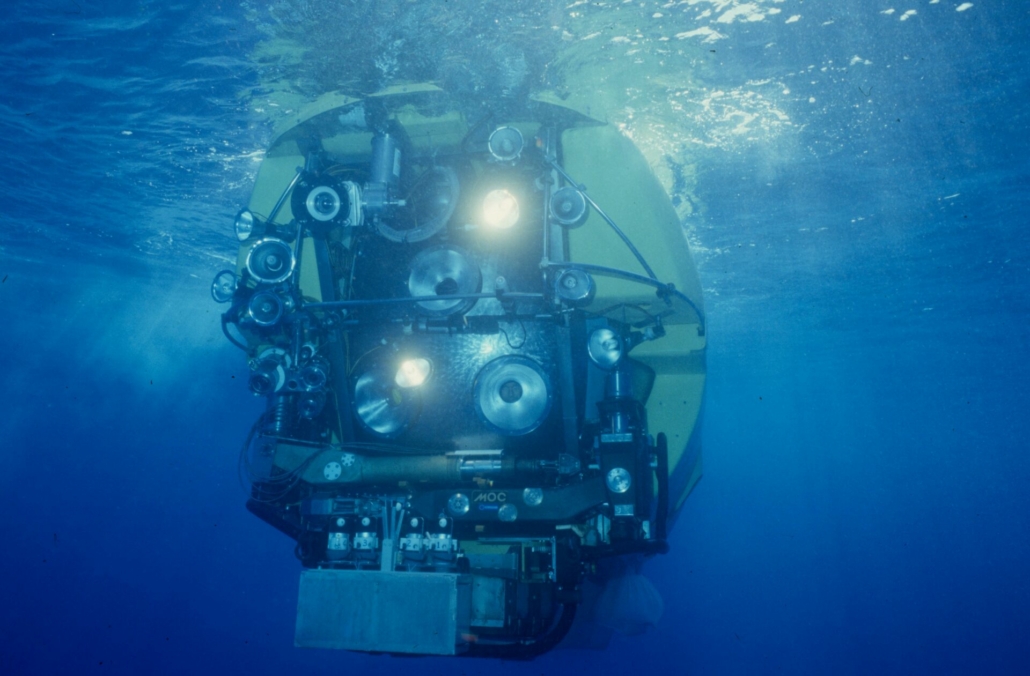
Quelle: Lacoupelle / Ifremer Vue sous-marine du Nautile
Panelists
Daniela Zeppilli, Forscherin und Leiterin des Labors Tiefsee-Umwelt (LEP) am Ifremer in Brest, Frankreich, verfügt über Fachkenntnisse in benthischer Ökologie, insbesondere Nematoden, und Taxonomie der Tiefsee und extremer Meeresumgebungen.
Nicolas Pade, Exekutivdirektor des EMBRC-ERIC-Projekts in Paris, Frankreich, leitet die europäische Forschungsinfrastruktur des European Marine Biological Resource Centre (EMBRC-ERIC) und verfügt über Fachwissen in Meeresökologie.
Nicolas Segebarth, Doktor der Chemie, Policy Officer bei der europäischen Kommission in Brüssel, Belgien, hat sich dem Referat „Healthy Oceans and Seas“ der Generaldirektion Forschung und Innovation angeschlossen, um die Forschungs- & Innovationspolitik zur Beobachtung der Ozeane zu entwickeln und umzusetzen. Er arbeitet insbesondere an der „Blue Cloud“, einer von der Kommission vorangetriebenen Vision zur Schaffung eines digitalen Avatars der Ozeane.
Alice Vadrot, leitende Forscherin des ERC-Projekts MARIPOLDATA und außerordentliche Professorin an der Abteilung für Politikwissenschaft der Universität Wien, verfügt über Expertise an der Schnittstelle zwischen Wissenschaft und Politik im Bereich Biodiversität sowie über Kenntnisse der Verhandlungen zum BBJN, dem neuen Vertrag zum Schutz der marinen Biodiversität in den Ozeanen.
Moderation von Krystel Wanneau (MARIPOLDATA)
Das Event wird organisiert von:
- MARIPOLDATA erc Forschungsprojekt der Universität Wien
- Institut Français d’Autriche
- Französische Botschaft in Österreich
Es findet im Rahmen der Europäischen Wochen der nachhaltigen Entwicklung des Institut Français d’Autriche und der Französischen Botschaft statt.
*****
Bien que les océans couvrent 70% de la surface de notre planète, nous en savons étonnamment peu sur les mondes sous-marins et les êtres vivants qui les peuplent. Ainsi, les scientifiques estiment que nous ne connaissons qu’une infime partie de la biodiversité marine.
Dans ce contexte, les technologies numériques jouent un rôle important dans l’amélioration de l’exploration des océans. Depuis les années 1990, des technologies telles que la robotique, l’ADN environnemental, les capteurs haute performance, l’automatisation des processus, l’intelligence artificielle ou l’informatique en nuage se diffusent rapidement dans les pratiques scientifiques. Elles permettent de plonger plus profondément que jamais dans les réalités et la surface des océans et de créer ce que l’on appelle des « jumeaux numériques » de l’océan et de ses êtres vivants.
En outre, les sphères politiques reconnaissent également l’importance des technologies numériques pour l’exploration et la protection des océans comme l’atteste la Décennie de l’océan des Nations unies.
Cet événement, coorganisé par l’Institut français d’Autriche et l’équipe du projet ERC MARIPOLDATA de l’Université de Vienne, donnera l’occasion à quatre experts des mondes scientifiques et politiques de discuter du rôle, des opportunités et des défis de la numérisation et les nouvelles technologies pour l’exploration des océans et la protection de leur biodiversité.
En guise d’introduction et pour illustrer le sujet, le court documentaire Pourquoi pas les abysses ? produit par l’Ifremer et qui donne un aperçu des pratiques scientifiques dans le domaine de l’exploration des abysses, sera projeté.
L’événement est en français et en allemand avec une traduction simultanée dans l’autre langue.
Heure et lieu
20 septembre 2022, 18:00-20:00
Institut Français d’Autriche, Praterstraße 38, 1020 Wien
Inscription : https://www.eventbrite.fr/e/billets-quels-enjeux-et-opportunites-du-numerique-pour-la-biodiversite-marine-406192722367
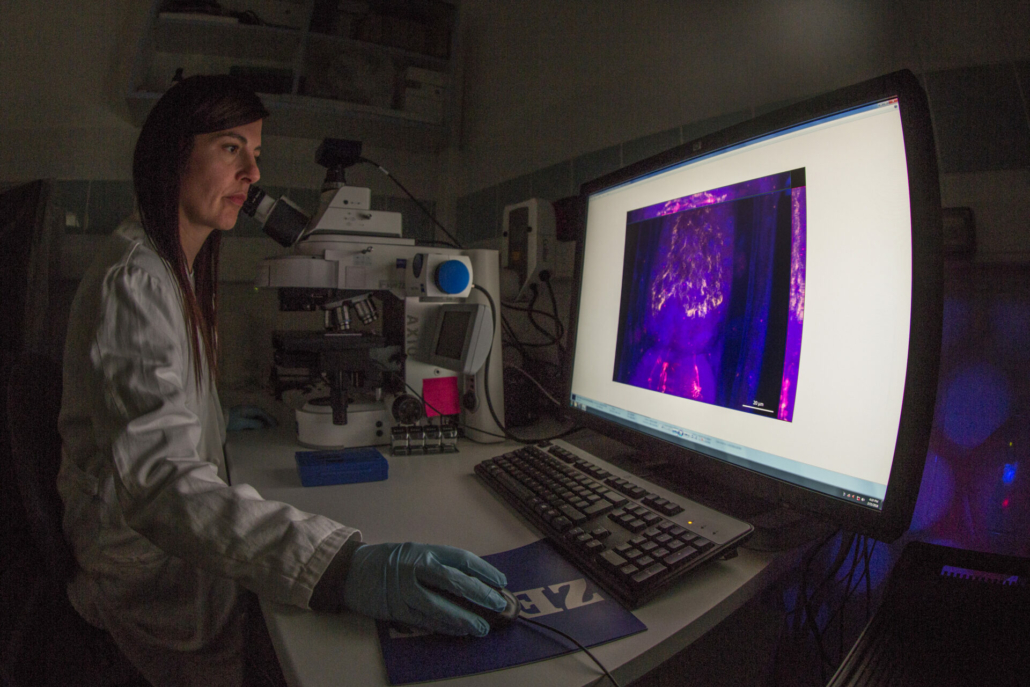
Daniela Zeppilli at work; Source: Gilles Martin / Ifremer
Intervenant(e)s
Daniela Zeppilli, chercheuse et directrice du « Laboratoire environnement profond » (LEP) de l’Ifremer à Brest, France, dispose d’une expertise en écologie benthique, notamment spécialiste des nématodes, et taxonomie des environnements marins profonds et extrêmes.
Nicolas Pade, directeur exécutif du projet EMBRC-ERIC, à Paris, France, est à la tête de l’infrastructure de recherche européenne du Centre européen de ressources biologiques marine (EMBRC-ERIC) et dispose d’une expertise en écologie marine.
Nicolas Segebarth, Docteur en chimie, chargé de politiques à la Commission européenne à Bruxelles, Belgique, a rejoint l’unité “Healthy Oceans and Seas” de la Direction Générale Recherche et Innovation, pour développer et mettre en œuvre la politique de recherche & innovation sur l’observation des océans. Il travaille notamment sur le “Blue Cloud”, une vision portée par la Commission pour créer un jumeau numérique des océans.
Alice Vadrot, chercheuse principale du projet ERC MARIPOLDATA et professeure associée du département de science politique de l’Université de Vienne, dispose d’une expertise sur l’interface entre science et politique en biodiversité et une connaissance des négociations du BBJN, le nouveau traité sur la protection de la biodiversité marine dans les océans.
Modération par Krystel Wanneau (MARIPOLDATA).
Cet événement est organisé par:
- L’équipe du projet MARIPOLDATA (Université de Vienne)
- L’Institut français d’Autriche
- L’Ambassade de France en Autriche
Evénement organisé dans le cadre des Semaines européennes du développement durable, organisées par l’Institut français d’Autriche et l’Ambassade de France en Autriche.
"Identifying and Describing Ecologically or Biologically Significant Marine Areas (EBSAs): A Key Tool for the Protection of Ocean Biodiversity in Dispute" with Christian Prip - Ocean Seminar, 14.09.2022
Date: Wednesday, 14 September 2022
Time: 05:00-06:30pm (CEST)
Venue: Online (Zoom)
The distribution of legal authority to protect biodiversity in marine areas beyond national jurisdiction (ABNJ) between the Convention on Biological Diversity (CBD) and the UN Law of the Sea Convention (LOSC) has been a contentious issue. In practice, main responsibility has been allocated to LOSC, under which a new implementing agreement on conservation and sustainable use of marine biodiversity of areas beyond national jurisdiction (BBNJ) is currently being negotiated and now close to being completed. CBD was allocated responsibility for providing scientific information and advice on marine biodiversity, which has resulted in the identification and description of 321 Ecologically or Biologically Significant Marine Areas (EBSAs) worldwide, within and beyond national jurisdiction. These could provide important scientific backing for a coming BBNJ instrument under LOSC, especially as regards the designation of marine protected areas and the conduct of environmental impact assessments in ABNJ. However, the process of modifying EBSAs and identifying new ones has recently been challenged by the CBD Conference of the Parties, harking back to previous disputes over the legal mandate and thereby threatening the entire mechanism that has been established. In the context of international environmental law and law of the sea, Senior Researcher Christian Prip will discuss the distribution of competence between the two instruments and the potential importance of EBSAs for the expected BBNJ instrument, using the Central Arctic Ocean EBSA as an example.
Christian Prip is a Senior Researcher at the Fridtjof Nansen Institute Norway with a law background. His core area of research is international environmental law and governance with a specific emphasis on biodiversity, oceans and the Arctic. Before entering academia, Prip has 20 years of experience as a lead negotiator in international environmental negotiations for his native country Denmark. From 2005 to 2007 he was Chair of the Subsidiary Body on Technical, Technological and Scientific Advice (SBSTTA) under the Convention on Biological Diversity.
To register: Send an email to maripoldata.erc@univie.ac.at, indicating your name and institution
Downloadable Flyer:
"So near and yet so far: Prospects for the conclusion of a BBNJ Treaty in August 2022" with Joanna Mossop - Ocean Seminar, 10.08.2022
Date: Wednesday, 10 August 2022
Time: 10:00-11:30am (CEST)
Venue: Online (Zoom)
Negotiations for a new treaty for the conservation and sustainable use of marine biodiversity in areas beyond national jurisdiction (BBNJ) have been underway since 2018. In August 2022, delegates of states will gather in New York to attempt to finalise a treaty at session 5 of the Intergovernmental Conference (IGC5). Observers of IGC4 were optimistic that there was sufficient momentum to attempt to finalise the treaty at IGC5. In this discussion, Associate Professor Joanna Mossop will explore the challenges that will need to be overcome if a treaty is to be concluded, and some of the potential choices facing delegates. Is it possible to achieve an ambitious treaty in the two weeks of IGC5? Or will states find themselves booking another trip to New York for IGC6?
Joanna Mossop is an Associate Professor in law at Victoria University of Wellington, New Zealand. She has written extensively on the law of the sea, and has been following the negotiations of the BBNJ treaty as an observer on the New Zealand delegation (all views expressed are her own). In 2019 the New Zealand government nominated her to the list of arbitrators and conciliators under Annexes V and VII of the United Nations Convention on the Law of the Sea. She has provided support to the Oceans and Coastal Group of the IUCN Commission on Environmental Law, and has consulted for the UNDP. She is currently the New Zealand Vice-President of the Australia New Zealand Society of International Law and a co-chair of the Oceans and International Environmental Law Interest Group.
To register: Send an email to maripoldata.erc@univie.ac.at, indicating your name and institution
Find the Summary of the Session here
Downloadable Flyer:
"Borderless Conservation: Integrating connectivity into High Seas conservation efforts for the Salas y Gomez & Nazca Ridges" with Ben Boteler, Carlos Gaymer & Daniel Wagner - Ocean Seminar, 15.06.2022
Date: Wednesday, 15 June 2022
Time: 05:00-06:30pm (CEST)
Connectivity is essential to consider in area-based marine conservation measures because it greatly impacts vital ecological processes. However, it is generally not well studied or integrated into conservation measures, particularly in the Southeast Pacific. This region is home to the Salas y Gómez and Nazca ridges, two adjacent seamount chains that stretch between the Peruvian coast and Rapa Nui (Easter Island), that have been recognized as one of the most important areas to protect globally. However, over 73% of the ridges are in areas beyond national jurisdiction, where they are unprotected and under threat. This presentation will provide a synthesis of what we know about connectivity in the Salas y Gómez and Nazca ridges and provide some practical recommendations for integrating this knowledge into conservation and management measures for the region. While data on connectivity is still limited, it should not constrain the development of conservation measures, which should be co-designed and co-developed, leveraging the expertise of international working groups throughout the region. Due to their high rates of endemism, as well as importance as migratory corridors, enacting large-scale conservation measures would address important conservation considerations for both connectivity and representation. Enacting such large-scale conservation measures would not only elevate the Salas y Gómez and Nazca ridges as an exemplary example but could also help raise awareness on the severity of externally originating threats like climate change and plastic pollution to global audiences.
Ben Boteler is part of the ocean governance research team at the Institute for Advanced Sustainability Studies (IASS) in Potsdam, Germany. He is conducting research in an effort to advance and strengthen ocean governance including for the high seas (areas beyond national jurisdiction). In particular, his focus is on the socioeconomic uses and benefits obtained from the marine environment. He was the co-lead of the STRONG High Seas project (Strengthening Regional Ocean Governance for the High Seas), a five year project funded by the German Government (International Climate Initiative (IKI)) that aimed to develop comprehensive, cross-sectoral approaches for the conservation and sustainable use of biodiversity in the high seas.
Dr. Carlos Gaymer, UCN Dr. Gaymer is Professor at Universidad Católica del Norte (Chile) and Director of the Center for Ecology and Sustainable Management of Oceanic Islands (ESMOI), a center aiming to provide the scientific basis needed for the conservation of marine ecosystems on seamounts and oceanic islands of the south Pacific.
Dr. Daniel Wagner serves as the Chief Scientist for the Ocean Exploration Trust, where he oversees scientific aspects of research expeditions aboard E/V Nautilus. Dr. Wagner has conducted field research on marine ecosystems for close to 20 years, and has since participated in 27 multi-disciplinary research expeditions that explored some of the most remote deep-sea habitats in the Indo-Pacific, Atlantic, and Southern Oceans. Daniel grew up in Ecuador, and currently resides in Honolulu, Hawaii.
"The Ocean InfoHub Project and the Ocean Data and Information System" with Lucy Scott - Ocean Seminar, 11.05.2022
Date: Wednesday, 11 May 2022
Time: 10:00-11:30am (CEST)
With increasing ocean data of different forms and on diverse aspects of the marine environment, collected and used by a myriad of actors around the globe, the access to and sharing of such knowledge is crucial for future ocean governance.
In this MARIPOLDATA Ocean Seminar, Lucy Scott, marine scientist and Ocean InfoHub Project Manager will present the Ocean InfoHub (OIH), which facilitates access to global oceans information, data and knowledge products for management and sustainable development.
The OIH commenced in April 2020 and brings together three regional communities of practice (Africa, Latin America and the Caribbean, and the Pacific Small Island Developing States). It anchors a growing network of regional and thematic nodes that will improve online access to, and synthesis of existing global, regional and national data, information and knowledge resources, including existing clearinghouse mechanisms.
The project is not establishing a new database, but will be supporting discovery and interoperability of existing information systems through the development of a lightweight Ocean Data and Information System (ODIS) architecture. This enables users from Member States and other partners to discover data, data products, data services, information products and services. The OIH Project is a three-year project funded by the Government of Flanders, Kingdom of Belgium, and implemented by the IODE Project Office of the IOC/UNESCO.
Lucy Scott is a marine scientist specialising in marine data and information management, as well as Large Marine Ecosystems Science and Governance, with over 20 years’ experience in southern Africa, West and Central Africa and the Western Indian Ocean region. She has a Master’s degree in Ichthyology and has previously been the regional Data and Science Coordinator for the UNDP GEF Agulhas & Somali Current Large Marine Ecosystems (ASCLME) Project for which she coordinated regional science, data and information management activities and Transboundary Diagnostic Analysis (TDA) development for the project in nine countries. She has most recently worked for the IOC/UNESCO Project Office for IODE as the Project Manager of the Ocean InfoHub Project.
Downloadable Flyer:
"The Post-2020 Global Biodiversity Framework & BBNJ Agreement" with Lisa Campbell - Ocean Seminar, 13.04.2022
Date: Wednesday, 13 April 2022
Time: 05:00-06:30pm (CEST)
On-going negotiations for a new UNCLOS implementing agreement for the conservation and sustainable use of marine biodiversity beyond national jurisdiction (the BBNJ treaty) are occurring simultaneous to negotiations for a new strategic plan in the UN Convention on Biological Diversity (the Post-2020 Global Biodiversity Framework, GBF). Although area based management tools, such as marine protected areas (MPAs), are only one item within the BBNJ ‘package’, they were a key motivation for the negotiations. Arguments for extending MPAs to areas beyond national jurisdiction were articulated long before the current BBNJ treaty negotiations formally started, and in 2010 proponents lobbied the Convention on Biological Diversity (CBD) to lead this extension. Although at the time the CBD was disinclined to include the high seas within its mandate, the links between the CBD and the BBNJ treaty are many. In this talk, Lisa Campbell will explore some of these links, including: the CBD’s 2020 target for area expansion of MPAs and the proposed 30×30 (30% of global oceans in MPAs by 2030) target in the draft GBF; the CBD’s work to describe ecologically and biologically significant areas throughout the ocean; and current tensions around access and benefits sharing in both on-going negotiations. She will reflect on what the links reveal and/or reflect about global governance generally and for oceans specifically.
Lisa Campbell is the Rachel Carson Distinguished Professor of Marine Affairs and Policy at Duke University, and is based at the marine lab in Beaufort, North Carolina, USA. Her research is focused on oceans governance broadly, and in relation to diverse issues including: conservation targets, MPAs, small scale fisheries, protected species, and marine spatial planning. She draws on theory form political ecology, political economy, and science and technology studies to understand how science and other values, and state and non-state actors, inform governance processes and outcomes across geographic and socio- political scales.
To register: via email to maripoldata.erc@univie.ac.at, indicating your name and institution
Downloadable Flyer:
"Die Zukunft der Ozeane: die marine Biodiversität verhandeln" - Joint event with NHM, French Ambassy in Austria & Institut Francais - 05.04.2022
When: April 5 2022, 06:00-08:00pm
Where: Naturhistorisches Museum Wien
The event is in German & French
In the seas and oceans there exists a diversity of life that is still largely unexplored today and at the same time an important basis for human life.
Despite this, marine policy is still a little-known field among the general public and to date there is still no regulation on biodiversity in international waters.
However, in 2018, negotiations began at the United Nations for a new treaty on marine biodiversity in areas beyond national jurisdiction.
Science plays an important role in these negotiations, particularly in relation to marine protected areas and environmental impact assessment.
In the context of these ongoing and important negotiations, high-level speakers will talk about the scientific and political challenges of protecting marine biodiversity.
The event is organised by the Ambassade de France Autriche, Naturhistorisches Museum Wien, Institut Francais Autriche & the erc project MARIPOLDATA as part of the European Green Days in Vienna.
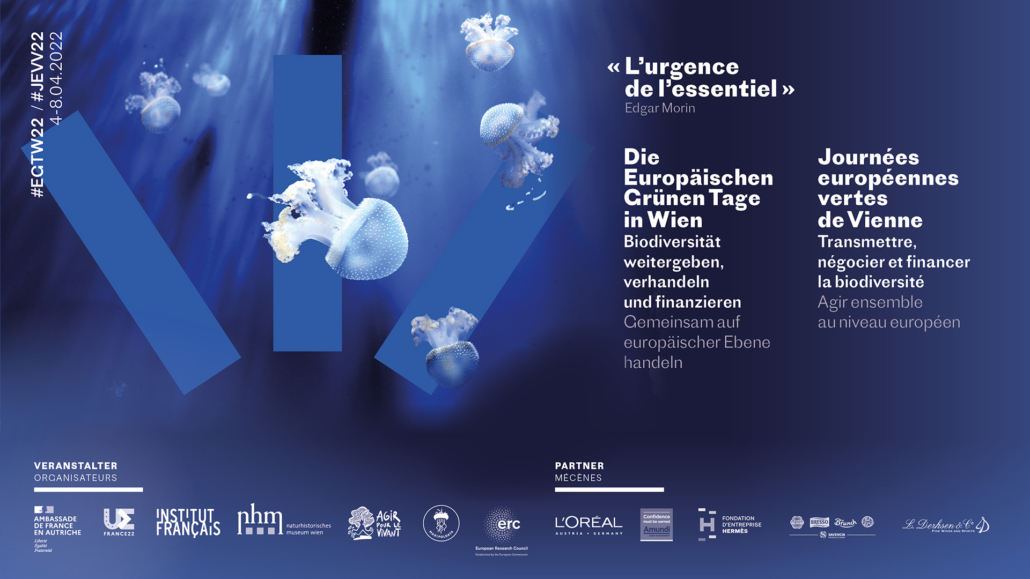
Programme:
Welcoming by Katrin Vohland, Director General and Scientific Managing Director, NHM Vienna & Gilles Pécout, Ambassador of the Republic of France to Austria
Introduction with presentations by Gerhard Herndl, Dean of the Institute for Life Sciences, University of Vienna & Alice Vadrot, Associate Professor, Institute for Political Science, University of Vienna and Head of the ERC project MARIPOLDATA
Panel discussion with Mar Benavides, Researcher at the Institute for Oceanography of the Mediterranean, Thomas Loidl, Head of Unit of the International Economic and Environmental Law, BMEIA & Georg Scattolin, Head of Global Solutions Programmes, WWF Austria.
Moderated by Elke Ziegler, science journalist at Ö1.
More info here.
"Recent Developments in the BBNJ Negotiations" with Gabriele Goettsche-Wanli - Ocean Seminar, 30.03.2022
Date: Wednesday, 30 March 2022
Time: 10:00-11:30am (CEST)
Negotiations for a new legally binding instrument for the conservation and sustainable use of marine biodiversity beyond national jurisdiction have taken place in person again this month after over two years of postponement due to the COVID-19 pandemic. There were a number of initiatives to keep the momentum during the extended intersessional period, e.g. a Virtual Intersessional Work by the President of the BBNJ Intergovernmental Conference and informal High Seas Treaty Dialogues, initiated by Belgium, Costa Rica and Monaco and an Alliance of NGOs (High Seas Alliance). Yet, online discussions could not reach the legal status of in-person negotiations and while it served for actors to discuss and clarify contentious topics to get them a step further to consensus, no formal advancements on the draft text could be made. When negotiators convened in New York this time, it was supposed to be the last session of the Conference to finalise the future BBNJ agreement, but pending issues remain that require further discussions and another session of the Conference is planned for August 2022.
In the MARIPOLDATA Ocean Seminar, Gabriele Goettsche-Wanli, Independent international lawyer, former Director of the Division for Ocean Affairs and the Law of the Sea, United Nations and one of the moderators of the High Seas Treaty Dialogues will give an overview of recent developments in the BBNJ process: How did the informal, virtual exchanges in the intersessional period impact the negotiations at the Conference? How did the COVID regulations, including a limited number of delegates allowed in the building and restrictions to observers, change the dynamics of the negotiations? What were the main outcomes in the different package elements and cross cutting issues after the two-week in-person negotiations in New York? What remains to be discussed in the coming months? And how can the time until the upcoming Conference be effectively used to further align positions and form a good negotiation basis?
Gabriele Goettsche-Wanli worked in the United Nations on ocean issues for almost 30 years, including as Director of the Division for Ocean Affairs and the Law of the Sea, Office of Legal Affairs. Since her retirement, she has moderated several informal dialogues among states and other stakeholders on BBNJ issues, amongst other activities.
Downloadable Flyer here:
"Polycentricity in BBNJ" with Kristina Gjerde & Siddarth Shekhar Yadav - Ocean Seminar, 16.02.2022
Date: Wednesday, 16 February 2022
Time: 05:00-06:30pm (CET)
The United Nations is currently in the final stages of negotiating a new UN Agreement for the conservation and sustainable use of marine biodiversity in areas beyond national jurisdiction (BBNJ Agreement). Because of its potential for customising global agreements to specific geographical regions, the regional level is being considered as an important vehicle for implementing the emerging BBNJ Agreement. This article uses lessons from regional ocean governance and polycentricity theory, combined with a prior analysis of resilience principles, to reveal that many of the key enabling conditions for a functional polycentric governance system are absent in ABNJ governance.
This includes lack of overarching rules for biodiversity conservation, mechanisms for cooperation and conflict resolution, and mismatches in jurisdictional scale. Taken together, these missing elements could hinder achievement of the objectives of the BBNJ Agreement to improve biodiversity conservation and sustainable use, and hamper integrated ecosystem-based management. On this basis, the article explores how the emerging BBNJ Agreement could improve the effectiveness of institutions and arrangements governing BBNJ in coping with growing uncertainty and rapid change as well as strengthen the resilience of ocean ecosystems and biodiversity.
Kristina M. Gjerde, J.D., is Senior High Seas Advisor to IUCN’s Global Marine and Polar Programme.
Kristina received her Juris Doctor from New York University School of Law with a focus on
comparative and international law, and practiced admiralty law for several years in a New York City
law firm. For the past 30+ years, Kristina has focused on the nexus of law, science, and policy relevant
to sustaining marine biodiversity. Kristina has co-founded four science-policy partnerships: the
Global Ocean Biodiversity Initiative, The Sargasso Sea Project, the High Seas Alliance and the Deep
Ocean Stewardship Initiative (DOSI). In addition to advancing a new UN treaty for marine life beyond
boundaries, she has authored or co-authored more than 150 publications. Kristina is an Honorary
Fellow of the University of Edinburgh School of Geosciences, an adjunct professor at the Middlebury
Institute of International Studies at Monterey, California, and lives in Cambridge, Massachusetts.
Siddharth Shekhar Yadav is the Advisor (on Climate Change, Oceans, and the UN High Seas/ BBNJ
Treaty) to the Ambassador/ Permanent Representative of the Republic of Vanuatu to the United
Nations, New York. Since 2018, Siddharth has supported decision-making in a number of multilateral
negotiations at the UN, including the BBNJ Treaty. Siddharth has represented Vanuatu at the UN
General Assembly, the UN Climate Action Summit, and the Youth Climate Summit at the UN
Headquarters. Siddharth has also represented Vanuatu at the 6th ‘Our Ocean Conference’ in Oslo,
Norway, and at the Pacific Small Island Developing States (PSIDS) Regional BBNJ IGC Workshop in
Pohnpei, the Federated States of Micronesia. Siddharth is committed to building resilience to climate
change and other pressures on biodiversity and ecosystems.
Downloadable Flyer:
"Traceability of Marine Genetic Resources under the BBNJ Agreement" with Dr. Fran Humphries - Ocean Seminar - 26.01.2022
Date: Wednesday, 26 January 2022
Time: 10:00-11:30am (CET)
Dr. Fran Humphries, has specialised in aquatic biodiversity, biotechnology and marine law/policy over the past 20 years. She is a chief investigator on a maritime artificial intelligence project at the Queensland University of Technology Law School, Australia. Her recent research consultancies include aquaculture, agriculture and forest genetic resource access and benefit sharing (ABS) projects for WorldFish, the Food and Agriculture Organization of the United Nations and the ABS Capacity Development Initiative. She was on the International Council of Environmental Law delegation for the negotiations of the proposed United Nations Convention on the Law of the Sea internationally legally binding instrument for the conservation and sustainable use of marine biodiversity in areas beyond national jurisdiction. She has a background in government, working as a legal and policy advisor in the areas of biosecurity, fisheries management and aquaculture, and she is an Australian accredited mediator for maritime/marine disputes.
Traceability infrastructure for monitoring the use and movements of marine genetic resources (MGRs) from areas beyond national jurisdiction (ABNJ) will be a key component of the proposed biodiversity (BBNJ) treaty under UNCLOS. Traceability is important for determining origin of MGRs after they are collected from ABNJ and linking origin with the chain of custody of the genetic materials as they pass through national jurisdictions, whose access and benefit sharing measures may apply to the MGR unless they fall outside scope. Traceability infrastructure may help to ascertain whether proposed benefit sharing provisions under the BBNJ draft text will be triggered by the use of MGRs for research, development and commercialisation. The most recent draft text proposes infrastructure including notification, identifiers and a clearing house mechanism. There are important positive and negative lessons to be learned for the BBNJ agreement from the implementation of traceability infrastructure under the Nagoya Protocol on Access to Genetic Resources and the Fair and Equitable Sharing of Benefits Arising from their Utilization to the Convention of Biological Diversity, which applies to MGRs within national jurisdiction. This talk aims to highlight some of the lessons learned, explain implications for the BBNJ context and promote discussion on a range of other options for traceability that may accommodate the unique geo-political conditions of ABNJ.
If you are want to join, please contact Ina Tessnow-von Wysocki (ina.tessnow-vonwysocki@univie.ac.at) indicating your name and institution.
Downloadable Flyer here:
"Conservation and Use of the Ocean Genome" with Dr. Robert Blasiak - Ocean Seminar - 8.12.2021
Date: Wednesday, 8 December 2021
Time: 10:00-11:30am (CET)
Dr. Robert Blasiak, is a researcher at the Stockholm Resilience Centre, where he co-leads the Centre’s “Human Ocean” research theme and leads the FORMAS project “The marine biotechnology industry and equitable governance of marine genetic resources”. In the context of marine genetic resources, he has co-led several international collaborations, including for the Blue Climate Initiative, the World Ocean Assessment and the High Level Panel for a Sustainable Ocean Economy. He is a visiting researcher at the University of Tokyo and was previously a NEREUS research fellow funded by the Nippon Foundation.
How could you not be interested in marine genetic resources? In recent decades, our capacity to understand the ocean at a genetic level has been advancing at light-speed: new sequencing technologies, exponentially growing databases of genetic sequence data, and a suite of new applications for exploration and conservation. At the same time, marine biotechnology is a diverse and poorly quantified pillar of the blue economy, ranging from high-profile uses in the development of pharmaceuticals to lesser known uses as industrial enzymes for biofuel production, food additives and antifouling compounds. Yet tapping the full potential of the ocean genome for science, conservation and commercial uses depends on addressing core issues surrounding capacity, equity and biosafety. As a result, marine genetic resources are a key element of multiple ongoing negotiations and processes, most notably with regard to biodiversity in areas beyond national jurisdiction (BBNJ). This seminar will describe the concept of the ocean genome, the benefits it provides, the threats it faces, and prospects for increasing equity in the context of ongoing international processes.
A summary of the session here.
Downloadable Flyer:
"Dispute Prevention & International Community Interests in BBNJ" with Assoc. Prof. Cymie Payne - Ocean Seminar - 10.11.2021
Date: Wednesday, 10 November 2021
Time: 5:00-6:30pm (CET)
Cymie Payne is Associate Professor at Rutgers University, New Jersey. She researches global governance of the environment and the consequent evolution of international law, with a focus on climate change, ocean resources and protection of the environment in relation to armed conflict. She has special expertise in the international law of responsibility, liability and compensation for environmental damage, and nonmarket environmental damage valuation. She participates in the BBNJ negotiation with the IUCN delegation. She has participated as counsel and expert in cases before the International Tribunal for the Law of the Sea and the International Court of Justice, and was legal officer with the environmental reparations program at the UNCC. She holds a MA from The Fletcher School of Law and Diplomacy and a JD from the University of California, Berkeley, and is a Fellow of the American College of Environmental Lawyers and a member of the International Law Association Committee on Sustainable Natural Resource Management For Development.
Legal rules for the ocean where it lies beyond the jurisdiction of individual sovereign states have significant defects. This was due to the primitive state of scientific information about the ocean’s physical properties and life forms, although the UN Law of the Sea Convention, agreed and codified in 1982, brought important advances to ocean governance.
Years of discussion at the United Nations led to a preparatory conference (2016-2017) followed by an intergovernmental negotiation of a new legally binding instrument mandated for the conservation and sustainable use of marine biological diversity (BBNJ) (2018 to the present). The new agreement should operationalize the Convention’s article 192, states’ obligations to the international community to protect and preserve the marine environment.
This seminar will explore how a modern agreement for the ocean could respond to the needs of Earth governance in the Anthropocene.
If you want to join please contact: ina.tessnow-vonwysocki@univie.ac.at
Downloadable Flyer:
"CITES and the Sea" with Daniel Kachelriess - Ocean Seminar - 20.10.2021
Date: Wednesday, 20 October 2021
Time: 10:00-11:30am (CEST)
Daniel Kachelriess is Senior Policy Specialist at Sea Shepherd Legal and has previously served in several roles at the interface between science, policy and law, including as Marine Species Officer at the CITES Secretariat and as Advisor to the Permanent Mission of the Republic of Maldives. In 2018 he attended the Rhodes Academy of Oceans Law and Policy.
The Convention on the International Trade in Endangered Species of Wild Fauna and Flora, short CITES, enjoys a reputation as one of the most effective international conservation tools and with 183 Parties, it is also one of the most universal agreements of its kind. CITES mandate is to regulate international trade in species listed on its Appendices to ensure that such trade is “not detrimental to the survival of the species in the wild”.
When CITES was negotiated and subsequently signed in 1973 its drafters clearly recognized the potential application of the Convention for marine species and included provisions specific to that context. The most notable of those is “Introduction from the Sea” (IFS), which effectively gives CITES a mandate to regulate some high seas activities.
Despite this, CITES saw limited use in the international fisheries context with the exception of a few regionally important fisheries such as Queen Conch in the Caribbean. CITES CoP16 (Bangkok, 2013) proved to be a game-changer when Parties agreed on how to implement “Introduction from the Sea” in practice and decided to add several species of commercially exploited sharks and manta rays to the CITES Appendices. This trend was continued for subsequent CoPs (CoP17, Johannesburg, 2016; CoP18, Geneva, 2019), accompanied by dedicated capacity building from a range of actors to assist Parties to implement CITES for marine species.
This presentation will start off with a brief overview of key CITES’ provisions, the history of marine species listings and insights from the related implementation support and capacity building activities. The second part of the presentation will discuss lessons learned from CITES against the backdrop of current policy processes and draw on two examples, a proposed wildlife protocol under the UN Convention against Transnational Organized Crime (UNTOC), and the new agreement on the conservation and sustainable use of marine biodiversity of areas beyond national jurisdiction (BBNJ).
A summary of the session here.
If you want to join please contact: ina.tessnow-vonwysocki@univie.ac.at
"Deep-Sea Mining and the International Seabed Authority" with Pradeep Arjan Singh - Ocean Seminar - 29.09.2021
Deep-Sea Mining and the International Seabed Authority:
Recent Developments, key outstanding issues and contrasting narratives
Date: Wednesday, 29 September 2021
Time: 5:00-6:30pm (CEST)
Venue: Virtual Meeting
Pradeep Arjan Singh, is a doctoral candidate at the University of Bremen, Germany and an independent research consultant. His areas of expertise are public international law, the law of the sea, international environmental law, climate policy, and ocean governance. Pradeep has spent the last five years working on legal and regulatory aspects of deep seabed mining and the conservation and sustainable use of marine biodiversity in areas beyond national jurisdiction.
Recent years have witnessed a rapid increase in interest to exploit the mineral resources of the deep ocean. Deposits located at depths greater than 200 m, such as polymetallic nodules, polymetallic sulphides and ferromanganese crusts, are known to consist critical and valuable metals such as nickel, copper, cobalt and manganese. Minerals in seabed areas beyond national jurisdiction, designated as the common heritage of humankind, are currently at the centre of attention as negotiations on regulations to facilitate exploitation activities are ongoing at the International Seabed Authority (ISA).
This presentation is divided into two parts. The first part will highlight recent developments at the ISA, whereby the recent invocation of a treaty provision known as the ‘two-year’ rule by the Republic of Nauru has necessitated the Council of the ISA to make haste with the negotiations of the exploitation regulations and complete the same by July 2023. In this respect, the presentation will discuss some of the key outstanding issues that remain unresolved as the Council of the ISA sets out to meet this seemingly insurmountable task before the deadline.
The second part of the presentation will delve into some narratives on deep-sea mining that have recently found their way into the ISA. This includes the discourse that deep-sea mining is essential to achieve the clean energy transition or that it is socially beneficial and environmentally friendly (at least when compared to terrestrial mining) and therefore sustainable on the one hand, and weighing some of these portrayals against marine conservation concerns and increasing calls for a moratorium on the other hand.
If you want to join please contact: ina.tessnow-vonwysocki@univie.ac.at
For the summary of the session as PDF click here.
Downloadable Flyer here:
"Developing countries in the BBNJ - CARICOM interests from a blue economy perspective and a proposed approach to EIAs" with Kahlil Hassanali - Ocean Seminar - 23.06.2021
Date: 23 June 2021
Time: 17:00-18:30 (CEST)
Venue: Virtual Meeting
Kahlil Hassanali, PhD student at the World Maritime University, Sasakawa Global Ocean Institute presented his work on CARICOM and his article “Internationalization of EIA in a new marine biodiversity agreement under the Law of the Sea Convention: A proposal for a tiered approach to review and decision-making” ( Hassanali, 2021).
Kahlil Hassanali has over eight years’ experience as a research officer in marine policy and governance at the Institute of Marine Affairs, a multidisciplinary marine and environmental research organization in Trinidad and Tobago. He has a strong interest in the creation and implementation of policy focused on conservation and the sustainable use of ocean and coastal resources, especially within national and regional contexts.
Kahlil´s PhD research is examining the inter-relationship between aspects of the legally binding instrument being negotiated under the United Nations Convention on the Law of the Sea on the conservation and sustainable use of marine biological diversity of areas beyond national jurisdiction (the BBNJ agreement) and the blue economy of the Caribbean Community (CARICOM). He also serves as a negotiator for the CARICOM in the process to develop the BBNJ agreement.
A summary of the session here.
"Capacity building and the BBNJ Agreement?" with Harriet Harden-Davies - Ocean Seminar - 19.05.2021
Date: 19 May 2021
Time: 17:00-18:30 (CEST)
Venue: Virtual Meeting
Dr. Harriet Harden-Davies, Ocean Nexus postdoctoral research fellow at the Australian Centre for Ocean Resources and Security (ANCORS) and Guest Investigator at the Woods Hole Oceanographic Institute reflected on the topic of capacity building in the development of a new treaty for marine biodiversity beyond national jurisdiction (BBNJ).
Recommended readings for the session:
- An article by Harden-Davies and Snelgrove: Science Collaboration for Capacity Building: Advancing Technology Transfer Through a Treaty for Biodiversity Beyond National Jurisdiction.Frontiers in Marine Science (2020): Frontiers in Marine Science, 2020-02-28, Vol.7.
- The summary for policy-makers of the recent Alliance of Small Island States (AOSIS) report on Capacity Challenges and Options relating to Marine Genetic Resources of Areas Beyond National Jurisdiction. https://www.aosis.org/reports/international-framework-for-laws-governing-deep-sea-depends-on-the-technological-readiness-of-small-island-states/
- A recent book chapter on Capacity Building in Marine Science in relation to the BBNJ negotiations: Hoel, A. H. (2021). Chapter 11: Capacity Building in Marine Science–Added Value of the BBNJ? In Marine Biodiversity of Areas beyond National Jurisdiction. Leiden, The Netherlands: Brill | Nijhoff.
A summary of the session here.
"Institutional Arrangements for the BBNJ Agreement - where are we now?" with Nichola Clark - Ocean Seminar - 21.04.2021
Date: 21 April 2021
Time: 17.00 – 18.30 (CET)
Venue: Virtual Meeting
Nichola A. Clark, presented her recent article “Institutional arrangements for the new BBNJ agreement: Moving beyond global, regional, and hybrid” (Clark 2020).
Nichola is an Officer on the Protecting Ocean Life on the High Seas team at the Pew Charitable Trusts, where she follows the negotiations for the new high seas treaty. Nichola is also a PhD candidate at the University of Wollongong’s Australian National Centre for Ocean Resources and Security (ANCORS) where her research focuses on area-based management tools and institutional arrangements for the BBNJ agreement. She is particularly interested in thinking about how the BBNJ Agreement will interact with existing regional and sectoral organizations without ‘undermining’ them. Nichola is also a member of the sixth cohort of Homeward Bound, a global leadership program for women in STEMM.
The summary of the exchanges here.
"The Territories of Ocean Governance" with Kimberley Peters - Ocean Seminar - 24.03.2021
Date: 24 March 2021
Time: 17.00 – 18.30 (CET)
Venue: Virtual Meeting
The MARIPOLDATA team had the pleasure to discuss ocean infrastructures with Prof. Kimberly Peters and her article “The territories of governance: unpacking the ontologies and geophilosophies of fixes to flexible ocean management, and beyond“(Peters 2020).
A human geographer by training, Kim’s work takes place in the context of the seas and oceans. Her work sets about exploring how power operates in the marine environment and how governance works (and fails). She has explored this in the context of pirate radio ships, prison hulks, deep-sea mining to vessel traffic management. She is also interested in theoretical approaches to understanding our (geo)political relations with sea and ocean spaces. Kim has published various books and papers on these topics. She was formerly a Reader in Human Geography at the University of Liverpool where she continues to hold an Honorary Fellowship. She is now Professor of Marine Governance at the HIFMB, a new research institute combining the Alfred Wegener Institute and the University Oldenburg.
The summary of the exchanges here.
"Epistemic Infrastructures of Knowing the Sea.The case of Maritime Domain Awareness" with Christian Bueger - Ocean Seminar - 24.02.2021
Time: 17.00 – 18.30 (CET)
Venue: Virtual Meeting
The Ocean Seminar Series welcomed Christian Bueger, Professor of International Relations at the Department of Political Science, University of Copenhagen. He is also an honorary professor of the University of Seychelles, a research fellow at the University of Stellenbosch and the Co-Director of the SafeSeas network. His research draws on ideas from practice theory and the sociology of science to understand changing patterns of knowing and governing the oceans. He is the author of International Practice Theory (Palgrave MacMIllan, 2018, with Frank Gadinger). For further information and papers see his personal website.
The summary of the discussion available here.
"Marine Genetic Resources" with Konrad Marciniak - Ocean Seminar - 27.01.2021
Date: 27 January 2021
Time: 16.00 – 17.30 (CET)
Venue: Virtual Meeting
The MARIPOLDATA Team introduced the new Ocean Seminar Series this month. In the first session, we welcomed Konrad Marciniak, PhD in law and Director at the Legal and Treaty Department of the Ministry of Foreign Affairs of the Republic of Poland. He presented his recent book chapter on “The Legal Status of Marine Genetic Resources”.
Summary of the exchanges here.
"Ocean Monitoring, Control and Surveillance" with Klaudija Cremers - Virtual Reading Group - 16.12.2020
Date: 16 December 2020
Time: 17.00 – 18.30 (CET)
Venue: Virtual Meeting
Klaudija Cremers, Research Fellow in International Ocean Governance at IDDRI presented the article Strengthening monitoring, control and surveillance of human activities in marine areas beyond national jurisdiction: Challenges and opportunities for an international legally binding instrument (Cremers et al., 2020).
The summary of the discussion here.
"Ocean Privatization" with Achim Schlüter - MARIPOLDATA Reading Group - 25.11.2020
Date: 25 November 2020
Time: 17.00 – 18.30 (CET)
Venue: Virtual Meeting
The MARIPOLDATA Reading Group welcomed Prof. Dr Achim Schlüter, Department Head (Social Sciences) and Working Group Leader (Institutional and Behavioural Economics) at the Leibniz Centre for Tropical Marine Research and Professor for Social Systems and Ecological Economics at Jacobs University to present his article Broadening the perspective on ocean privatizations: an interdisciplinary social science enquiry (Schlüter et al., 2020).
Summary of the exchanges here.
"Science-Policy Interfaces" in United Nations negotiations, with Christine Gaebel - MARIPOLDATA Reading Group - 28.10.2020
Date: 28 October 2020
Time: 17.00 – 18.30 (CEST)
Venue: Virtual Meeting
During this reading group session, we discussed how science meets policy for the question of how to regulate the use and protection of our ocean in the future.
We were happy to welcome Christine Gaebel, iAtlantic & ATLAS Policy Project Manager at the University of Edinburgh, to present her recent paper Recognising Stakeholder Conflict and Encouraging Consensus of ‘Science-Based Management’ Approaches for Marine Biodiversity Beyond National Jurisdiction (BBNJ).
Summary of the exchange here.
"Ethics and the BBNJ Agreement" with Carl Safina - MARIPOLDATA Reading Group - 23.09.2020
Date: 23 September 2020
Time: 17.00 – 18.30 (CEST)
Venue: Virtual Meeting
The MARIPOLDATA Reading Group had the opportunity to engage with Dr. Carl Safina, ecologist and founding president of the Safina Center, to discuss our ethical responsibility towards the ocean.
Summary of the exchanges here.
Innovative Session II during 2020 Virtual Forum on Earth System Governance - 15.09.2020
How do practitioners view our work? A transdisciplinary debate about the relevance of (studying) intergovernmental negotiation sites
Conveners: Hannah Hughes, Alice Vadrot
Date: 15 September, 2020
Time: 17.00 – 18.30
The central objective of this innovative panel is to facilitate an inter- and transdisciplinary dialogue between scholars studying intergovernmental environmental negotiation sites and the various actors (including national delegates, representatives of NGOs, treaty secretariats, youth movements and local and indigenous communities) in the field.
The panel will be organized as a roundtable, inviting participants 1) to share their experience and expert knowledge on the current state and development of environmental agreement making and so-called mega-events and 2) to reflect on scholarship using these sites for empirical research. The aim of the session is twofold: firstly, to provide an interactive space, where practitioners reflect on the relevance and value of empirical research and give feedback on current efforts to innovate methods for studying negotiation sites. Secondly, we aim to trigger a debate on the significance of those negotiation sites from the perspective of both, the practitioners that engage in agreement making processes as well as scholars of Global Environmental Politics and Earth System Governance studying them.
More information about the event here
"Fishing and the BBNJ Agreement" with Guillermo Ortuño Crespo - MARIPOLDATA Reading Group - August 19, 2020
With Guillermo Ortuño Crespo
Date: 19 August 2020
Time: 17.00 – 18.30
Venue: Virtual Meeting
The MARIPOLDATA Team welcome expert Dr. Guillermo Ortuño Crespo, to present his paper on “High-seas fish biodiversity is slipping through the governance net” and engage in the discussion afterwards.
Fisheries affect marine biodiversity in areas beyond national jurisdiction and a fragmented and incomplete ocean governance framework is currently charged with ensuring sustainable fisheries in the High Seas.
With the BBNJ agreement’s objective to conserve and sustainably use marine biodiversity in ABNJ, the connection between the BBNJ agreement and fishing practices in the High Seas has to be considered.
How is fishing affecting marine biodiversity in ABNJ?
What is the role of existing regional and sectoral organizations currently responsible for sustainable fisheries?
And what does it mean for marine biodiversity in ABNJ if fish was excluded from the BBNJ agreement?
Summary of the exchanges here.
"Rights of Nature" with Clement Yow Mulalap - MARIPOLDATA Reading Group - 22.07.2020
Date: 22 July 2020
Time: 17.00 – 18.30
Venue: Virtual Meeting
This week´s reading group focused on two articles:
• a paper considering how a Rights of Nature perspective might inform the BBNJ agreement
• a paper discussing the integration of the traditional knowledge of indigenous Peoples and local communities into the BBNJ instrument
Clement Yow Mulalap from the Permanent Mission of the Federated States of Micronesia to the United Nations in New York City presented one of his recent co-wrritten article Traditional Knowledge and the BBNJ instrument.
Summary of the exchanges here.
Marine Protected Areas (MPAs) in the High Seas - MARIPOLDATA Reading Group - 17.06.2020
How to protect marine biodiversity? Marine Protected Areas (MPAs) in the High Seas
Date: 17 June 2020
Time: 17.00 – 18.30
Venue: Virtual Meeting
After discussing the complexity of ocean governance last session, we turned more specifically to ocean protection in form of MPAs. The discussion was based on two readings :
• a paper on ecological connectivity of our oceans and resulting implications for MPA design
• a policy-relevant short forum article, which calls for mobile marine protected areas to be discussed in the upcoming BBNJ negotiations
This was an opportunity to reflect on current marine conservation and gather ideas for future ocean protection.
Summary of the exchanges here.
The complexity of global ocean governance - MARIPOLDATA Reading Group - 6.05.2020
The complexity of global ocean governance: Actors, instruments and international agreements
Date: 6 May 2020
Time: 17.00 – 18.30
Venue: Virtual Meeting
The team chose 2 readings which served as a basis for discussion.
The first one was an an introductory reading to the complexity of ocean governance, especially for persons who might not be so familiar with the topic.
The second text was an academic article on maritime political ecology: How can we study the relations of these various actors regulating our oceans, what are implications for them and for the protection of marine ecosystems?
In the reading group we connected this perspective to BBNJ issues and discussed the text in the light of the ongoing negotiations for the new BBNJ instrument.
BBNJ - MARIPOLDATA Reading Group - April 8, 2020
Topic: Politics of the international negotiations on the conservation and sustainable use of marine biodiversity beyond national jurisdiction
The team chose 2 readings which gave an insight into the ongoing negotiations and provided a basis for discussions.
Date: 8 April 2020
Time: 17.00 – 18.00
Venue: Virtual Meeting
The first one was a viewpoint piece and described conflict lines and outcomes of the latest conference of these negotiations.
The second article was a short piece, offering insights into debates on how the new instrument might affect the conduct of marine scientific research.
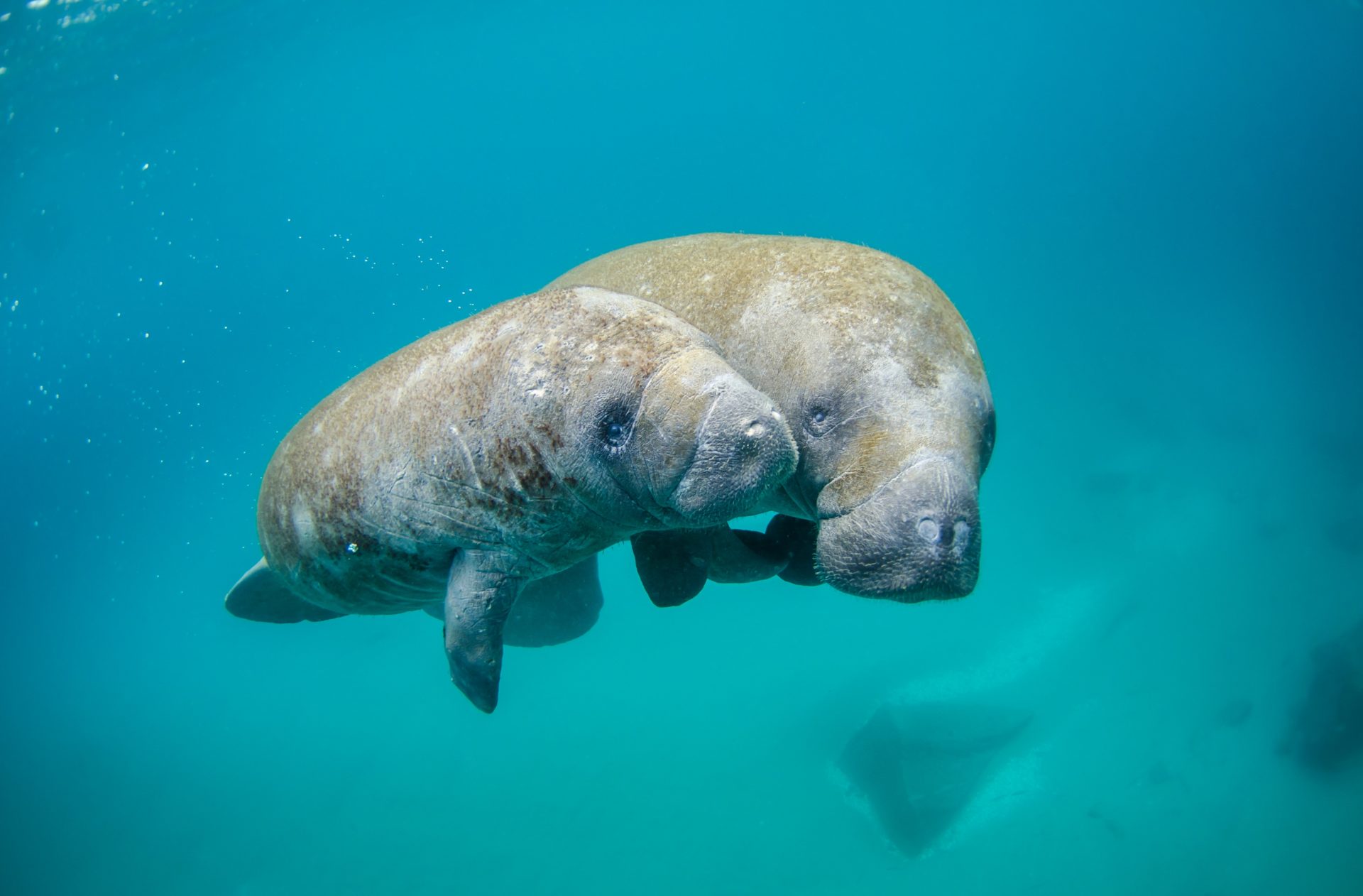 Are you new to the topic of this UN agreement and are wondering what it is about?
Are you new to the topic of this UN agreement and are wondering what it is about?
The United Nations are currently negotiating a new agreement for regulations of marine biodiversity in areas outside of national jurisdiction. This new legally binding agreement for the conservation and sustainable use of marine biodiversity in areas beyond national jurisdiction (BBNJ) includes topics on conservation (through marine protected areas and other area-based management tools, as well as environmental impact assessments) and seeks to find a mechanism to share access and benefits from marine genetic resources among the different states, as well as to guarantee capacity building and marine technology transfer to developing countries, where financial and technical means are missing for marine scientific research in the depths of our oceans.
"The Shifting Context of Sustainability: Growth and the World Ocean Regime" with Peter Jacques - MARIPOLDATA Seminar Series - 11.03.2020
The Shifting Context of Sustainability: Growth and the World Ocean Regime
Discussant: Dr. Monika Berg (Orebrö University)
Date: 11 March 2020
Time: 18.00 – 19.30
Venue: Conference Room – Neues Institutsgebäude (NIG), Universitätsstraße 7, 1010 Vienna
In the framework of the MARIPOLDATA seminar series and the IPW Lectures (Department of Political Science, Vienna University) we welcomed Peter Jacques from the University of Central Florida in Orlando, USA.
Please contact us via email if you would like to access the recorded talk of Peter Jacques : maripoldata.erc@univie.ac.at
The World Ocean Regime is not an official treaty agreed to by states in some formal process, but it probably governs the marine world. This talk discussed how this regime was discovered and the nature of the economistic values and norms that are the main feature. This includes how the idea of sustainability has changed over time in discourses about the ocean to become more growth-oriented in a way that is not actually sustainable.
Peter Jacques is a Professor of Political Science and affiliate faculty of UCF’s National Center for Integrated Coastal Research. He has extensive experience in the field of environmental politics and sustainability. Prof. Jacques is the President of the Association of Environmental Studies and Sciences for the term June 2018- June 2020. His research interests include Global Environmental Change, Sustainability Science, Indigenous Sustainability Issues, Ocean Conservation, Climate Change and Political Ecology/Green Political Theory.
Monika Berg is a senior lecturer in sociology and has a doctoral degree in political science. She is part of the Environmental Sociology Section at Örebro University. Monika is a guest researcher at the department of Political Science of the University of Vienna and in MARIPOLDATA in March 2020.
"How Evaluation shapes Ocean Science - A Multi-Scale Ethnography of Fluid Knowledge" with Sarah de Rijcke - MARIPOLDATA Seminar Series - 23.02.2020
How Evaluation shapes Ocean Science – A Multi-Scale Ethnography of Fluid Knowledge
Date: 23 January 2020
Time: 17.00 – 18.30
Venue: Wächtergasse 1, Top 5, 504, 1010 Vienna
In the framework of its seminar series, the MARIPOLDATA team had the pleasure to welcome in Vienna Sarah de Rijcke from the University of Leiden and director of the Centre for Science and Technology Studies (CTWS) in the Netherlands.
In 2018, Professor de Rijcke received an ERC Starting Grant for the project ‘FluidKnowledge – How evaluation shapes ocean science’. The ERC project will run from January 2019 until December 2023. On the occasion of the MARIPOLDATA seminar serie, she spoke about the progress of the FluidKnowledge project.
The FluidKnowledge project investigates the past, present and future of evaluating ocean science. Ocean science, like many fields, is under great pressure to be both scientifically excellent, and relevant to industry, and relevant to the future of the planet. How do steering efforts toward interdisciplinary engagement and societal relevance relate to other norms and criteria of scientific quality (e.g. excellence, global competitiveness) in actual practice? The team examines the intricate epistemic consequences that evaluation might have on concrete practices of knowledge creation by combining longitudinal quantitative analysis with rich ethnographic studies in different national contexts. They will also develop concepts to theoretically grasp the constitutive potential of research evaluation, based on such multilevel approaches.
Sarah de Rijcke is professor of Science, Technology, and Innovation Studies and director of CWTS, where she leads the Science and Evaluation Studies research group. Her current research program examines interactions between research governance and practices of knowledge production. Sarah is a member of the editorial board of Science, Technology, and Human Values (ST&HV), Science and Technology Studies, and Interdisciplinary Science Reviews. Professional memberships include the Society for the Social Studies of Science (4S), the European Association for the Study of Science and Technology (EASST) and the Dutch National research school for Science, Technology and Modern Culture (WTMC).
More information about the ERC project FluidKnowledge here.
Please confirm your participation via e-mail to maripoldata.erc@univie.ac.at
"Biodiversity collapse in the Eastern Mediterranean Sea" with Paolo Albano - MARIPOLDATA Seminar Series - 12.12.2019
Biodiversity collapse in the Eastern Mediterranean Sea
Date: 12 December 2019
Time: 16.30 – 18.00
Venue: Wächtergasse 1, Top 5, 504, 1010 Vienna
In the framework of the MARIPOLDATA seminar series, Paolo G. Albano, researcher at the Department of Paleontology at the University of Vienna gave a talk about the biodiversity collapse in the Eastern Mediterranean Sea.
The Levantine basin in the easternmost Mediterranean Sea is well known for hosting hundreds of non-indigenous species introduced after the opening of the Suez Canal in 1869. A still insufficiently recognized but equally dramatic phenomenon is the disappearance of native species. We have quantified this decline using intense sampling on the Israeli shelf targeting mollusks, and using death assemblages, the accumulation of empty shells in the sediments, to reconstruct the baseline.
On soft substrates, our sampling intercepted only 24% of the historically recorded species. On rocky substrates, our preliminary results show even fewer native species in respect to the baseline (ca 5-7%).
The talk will then discuss the potential explanations of this massive biodiversity loss pointing at the locally rapid climate warming as the most likely culprit.
Paolo G. Albano is a senior post-doctoral researcher at the Department of Paleontology of the University of Vienna and principal investigator of a project to explore the rapid changes occurring in the Eastern Mediterranean Sea. His research focuses on the patterns and processes of biodiversity loss in marine ecosystems, with a special focus on the Mediterranean Sea.
Please confirm your participation via e-mail to maripoldata.erc@univie.ac.at
"Whose Climate for What Politics?" with Marcela Vecchione Gonçalves - MARIPOLDATA Seminar Series - 12.09.2019
Whose Climate for What Politics? Attempts of a Political Ecology and Economy Analysis on Contemporary Brazilian Environmental Politics
Date: 12 September 2019
Time: 17.00 – 18.30
Venue: Wächtergasse 1, Top 5, 504, 1010 Vienna
In the framework of the first edition of its seminar series, the MARIPOLDATA team was very glad to welcome in Vienna Marcela Vecchione Gonçalves from the Federal University of Pará.
Fires, violence and intense political debates have been heating the political climate in Brazil lately. From within the Ministries and Presidential cabinets, reaching out to the rainforest animated by heated declarations amid the Parliament as well as within the broad political and civil society, environmental and climate politics, alongside with land and indigenous politics, have never been as much in the spotlight as it is currently the case in the country. It is well known fires and changes in tone and directions in policies related to rainforest protection and conservation contribute dramatically to global warming and loss in biodiversity. Nevertheless, what lacks reflection, particularly internationally, is how these changes also affect local and regional lives – including those at the Pan Amazon region, not just in Brazil, sparking violence through empowering a few who concentrate and use land disrespecting environmental, agrarian and labour legislation. Frequently, such violence is as much political as it is the disregard for other ways of living and for the rights to land accessed through a safe and collective natural environment; principles democratically coined by the 1988 Brazilian Constitution. In this sense, debates and global negotiations around the “Amazon issue” and its globality cannot afford to be also a debate about which environmental and climate politics we are talking, for whom and in which basis it is being carried on through international negotiations based on principles of an equitable and sustainable development. In what terms, the Brazilian case can prompt us in research, as well as in action, to relate resource politics to global political ecology? In other words, how do internal political change and its relation to land and resource politics in terms of positioning in global politics can help us reflecting on the connections between ecology and democracy? Human Rights and Rights to Development? Global Political Economy and Global Political Ecology? Violence, Autonomy and Resistance? At the same time, how an interconnected analysis can also provide us with elements to think on the nature of politics and the politcs of nature at the present history by bringing on its centrality to the possiblities of a radical democracy. We believe such points are essential to analyze the crisis in Brazil and why the crises in Brazil is turning into a diplomatic crises on the environment.
Marcela Vecchione Gonçalves is the head of the Graduate Studies Program on Sustainable Development at the Humid Tropics, hosted by the Centre of Advanced Amazonian Studies at the Federal University of Pará, Eastern Amazon, Brazil. She holds a PhD in International Relations and have been researching and teaching on Amazonian Political Ecology, Indigenous Peoples as well as Global Development in the last 12 years. Marcela is also a member and contributor of a number of Brazilian land and environmental movements.
Please confirm your participation via e-mail to maripoldata.erc@univie.ac.at
"Conducting research at global environmental negotiations" - MARIPOLDATA Workshop on Methods - 10-11.09.2019
Conducting research at global environmental negotiations
Date: September 10 – 11, 2019
Venue: University of Vienna
This workshop will bring together scholars experienced in global environmental negotiations and contributing to the development and application of conceptual and methodological innovations. The aim is to further develop these innovations and produce a guide for those new to the study of environmental meetings. To achieve this, the workshop will integrate the needs and perspectives of postgraduate scholars so that together we can explore how a new generation of research can be catalysed, the aim of which is to transform how we collectively study global environmental agreement making.
This workshop responds to the need for greater practical methodological guidance and is part of a series of events that are designed to facilitate in-depth discussion between experienced, early career and postgraduate researchers in order to develop appropriate research tools and frameworks.
The workshop builds on work by Hughes and Vadrot as published in a recent special section in Global Environmental Politics on Methodological Innovation in the Study of Global Environmental Agreement Making, edited by Hannah Hughes, Kimberly Marion Suiseeya and Alice Vadrot.
The workshop also draws on and informs research conducted in the ERC Project MARIPOLDATA directed by Alice Vadrot.
More information about the programme HERE.
"The role of oral histories in understanding science-policy interrelations" - MARIPOLDATA Workshop in cooperation with CSaP - 25.06.2019
Date: 25 June, 2019
Time: 13.00 – 17.00
Venue: Cambridge Judge Business School
Dr Alice Vadrot, principal investigator of the ERC funded research project MARIPOLDATA (which investigates the politics of marine biodiversity data), and the Centre for Science and Policy hosted a workshop on the role of oral histories in understanding science-policy interrelations.
Context
In order to protect marine biodiversity in areas beyond national jurisdiction (ABNJ) governments are currently negotiating a new legally binding treaty under the United Nations Convention on the Law of the Sea (UNCLOS). Marine biodiversity science plays a central role in supporting intergovernmental efforts to identify, protect and monitor marine biodiversity. This field will also inform governments on particular aspects of marine biodiversity, including its economic use and contribution to biosecurity. It will also shape the practicalities of certain policy options and the potential effects on ocean science conducted in ABNJ.
Mapping the overall field of marine biodiversity science, the leading scientific experts, how they are connected and how they are involved in international negotiations, is a necessary research step for understanding science-policy interrelations more broadly and why they matter in current intergovernmental negotiations for protecting marine biodiversity. Given that biodiversity science represents a heterogeneous bundle of research activities, interests and methodologies, individual scientists provide an important entry point for assessing and analysing how marine biodiversity has emerged as a key issue within ocean politics.
MARIPOLDATA kick-off meeting - 21.05.2019
Photo by Sara Santandrea on Unsplash
When: Tuesday, 21 May 2019, 17:45-21:30 CET
Where: Mezzanin7, Liechtensteinstraße 12/2/7, 1090 Vienna
The MARIPOLDATA Kick-off meeting took place on May 21, 2019 in Vienna.
After input from Univ.-Prof. Dr. Hajo Boomgaarden, Univ.-Prof. Dr. Barbara Prainsack, Dr. Julien Rochette and Julie Rigaud, Ass.-Prof. Dr. Alice Vadrot and her team presented MARIPOLDATA and opened the floor for questions and debate. The event was open to the interested public.
Please confirm your participation via e-mail to maripoldata.erc@univie.ac.at
Science Talk 2019 - 12.03.2019
Join us on a journey through the world of EU-funded early-stage research. Our academics present their research projects and talk about their life at the University. During the Science Talk, twelve awardees of the highly competitive ERC Starting Grant funding scheme present their major projects. Furthermore, six young postdoctoral fellows of the Marie Skłodowska-Curie mobility scheme talk about their research. In their presentations, these academics talk about the relevance of their results for the advancement of research and discuss how their research aims at promoting social and economic developments.
Seize this opportunity to ask our researchers questions and engage in a dialogue with them.
Tuesday, 12 March 2019, 17:00 – 19:30
Small Ceremonial Chamber of the University of Vienna (Kleiner Festsaal) – see map (pdf)
1010 Vienna, Universitätsring 1
